Asustor AS6704T Lockerstor 4 Gen 2 NAS Hardware Review – Worth Your Data?
When it comes to brands that I discuss here on the NASCompares when discussing NAS, one brand that always seems to have always existed (yet doesn’t get the same level of online fame as its peers) is Asustor. Founded in 2011, they have well over a decade of solutions under their belt and every time we see periodic refreshes come around from all the brands (every 2-2.5 years or so), we have seen them either be the first to bring some new tech to the market OR be the one that manages to bridge the gaps in the portfolios of the bigger brands with one of their own solutions. Today I want to review exactly that kind of solution, the Asustor Lockerstor 4 Gen 2. Now, that ‘Gen 2’ but is really important and not just a generic mini upgrade. When the original Lockstor series arrived in 2020, it had numerous features that their competitors had BUT crucially managed to consolidate brand unique ones, such as BTRFS and M.2 Slots like Synology, yet an HDMI 4K Port, 2.5GbE and an LCD display like QNAP – as I say, they always tend to bridge the gaps! The Lockerstor Gen 2 series arrives on the market 2+ years later and this new Gen 2 refresh brings upgrades to almost every single element of that hardware on offer (with only 1 real exception – and even then, it’s still tip-top). So, let’s take a closer look at that Asustor Lockerstor 4 Gen 2 NAS drive, see if ‘Gen 2’ is as good as it promises and whether this new NAS deserves your data?
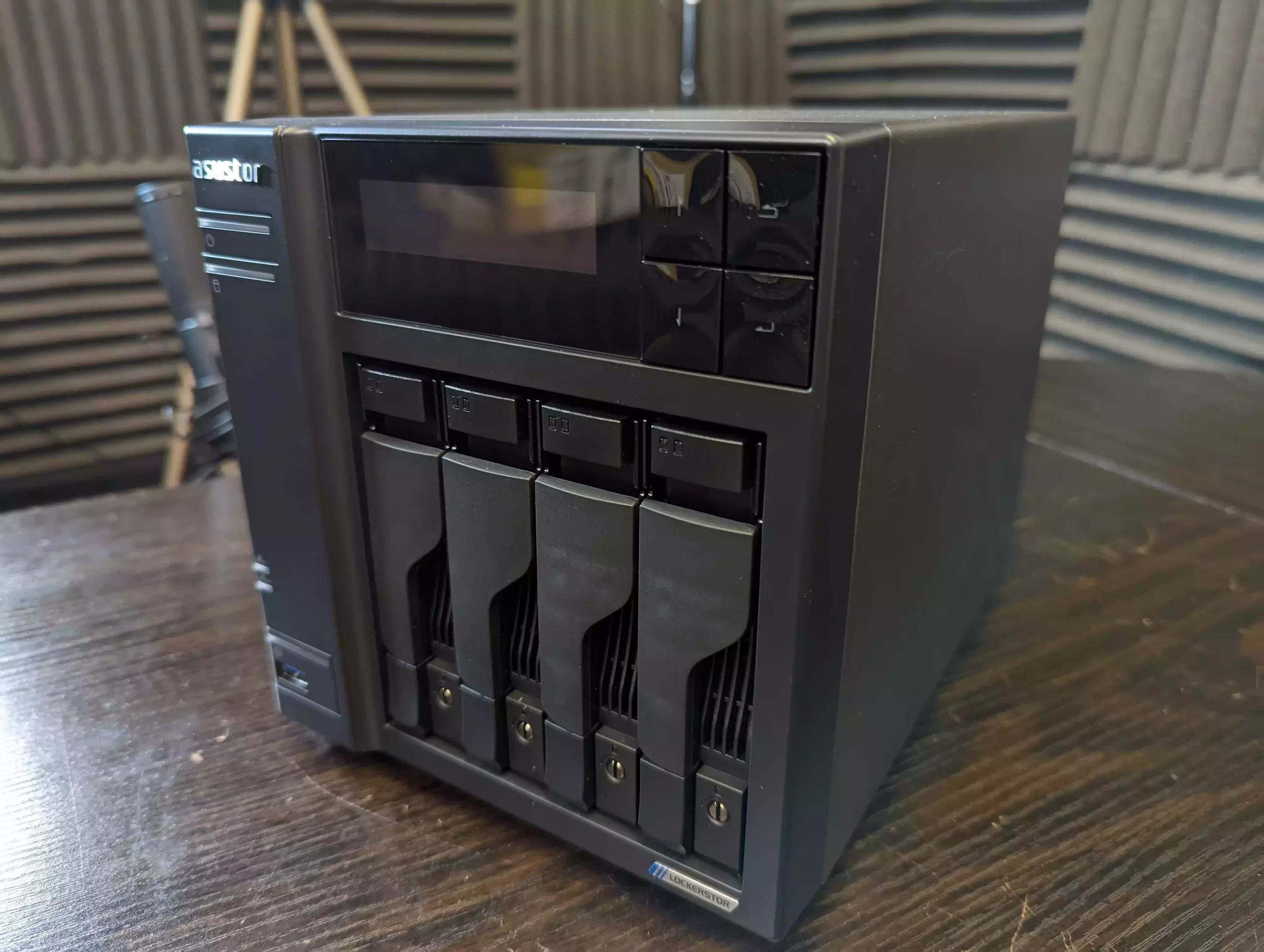
Asustor AS6704T Lockerstor 4 Gen 2 NAS Review – Quick Conclusion
The Lockerstor 4 Gen 2 NAS is a respectable piece of kit! Indeed, the hardware here is almost faultless! Unless you are particularly noise sensitive (and therefore the metal chassis adding a few dBa to the ambient sound), there is almost nothing I can fault here on the devices hardware. The scaling up of practically all hardware over the Gen 1 Lockerstor, such as Better CPU, Better Memory that goes higher, HDMI 2.0b, USB 3.2 Gen 2, a 10GbE upgrade option and THOSE FOUR M. 2 NVMe SSD SLOTS – you simply cannot fault how much is getting included here at the price point vs it’s competitors. The software is a little less compelling, with a smaller range of 1st party applications on offer, more of a reliance on 3rd party services and the absence of a few AAA+ features that are present on other devices in the market (AI services, Cloud Bolt on live synchronization, 1st Party SaaS native sync with Google Workspace/Office365, etc). That said, ADM does run very well, is clear and still quite user-friendly. The addition of choice of file systems EXT4 or BTRFS, flexibility on the use of those M.2 NVMe SSD bays and the Asustor HDMI portal still bring fantastic flexibility to the Lockerstor 4 Gen 2 NAS too. Ultimately, this is a system that is clearly making big waves on it’s hardware more than it’s software, but as long as you keep your feet on the ground and appreciate that this system is more of a 70/30 purchase of hardware vs software, you will come to respect and rely on this Asustor NAS as the backbone of your data storage setup.
| Where to Buy a Product | |||
|
|
    
|

|
VISIT RETAILER ➤ |
 |
    
|

|
VISIT RETAILER ➤ |
 |
    
|

|
VISIT RETAILER ➤ |
 |
    
|

|
VISIT RETAILER ➤ |
Asustor AS6704T Lockerstor 4 Gen 2 NAS Review – Packaging
Now, it is worth highlighting that I did review the first generation of the Lockerstor 4 back in Summer 2020, so if you have read that review, you are going to see alot of the same thing in terms of the presentation of the device with the Lockerstor 4 Gen 2 from Asustor. Credit to them, one area that in practically every single Asustor review I have ever done that the company always excels on, it is the retail packaging. I have been in the field of technology for quite a long time, as well as growing up as a 90s kid who would admire boxes from afar in my local tech retail outlet. Given the increase on the majority of tech purchases being made online, the necessity for eye-catching retail packaging is pretty low and therefore I am always pleasantly surprised when NAS devices like the Lockerstor 4 Gen 2 come along and put that extra bit of effort into to the point of sale design. Arriving in an attractive black and white box, it features numerous images of the Lockerstor 4 Gen 2 itself in near 1 to 1 scale, along with lots of highlighted information on the software and hardware advantages of this device. In short, I’m a sucker for a good bit of branding.
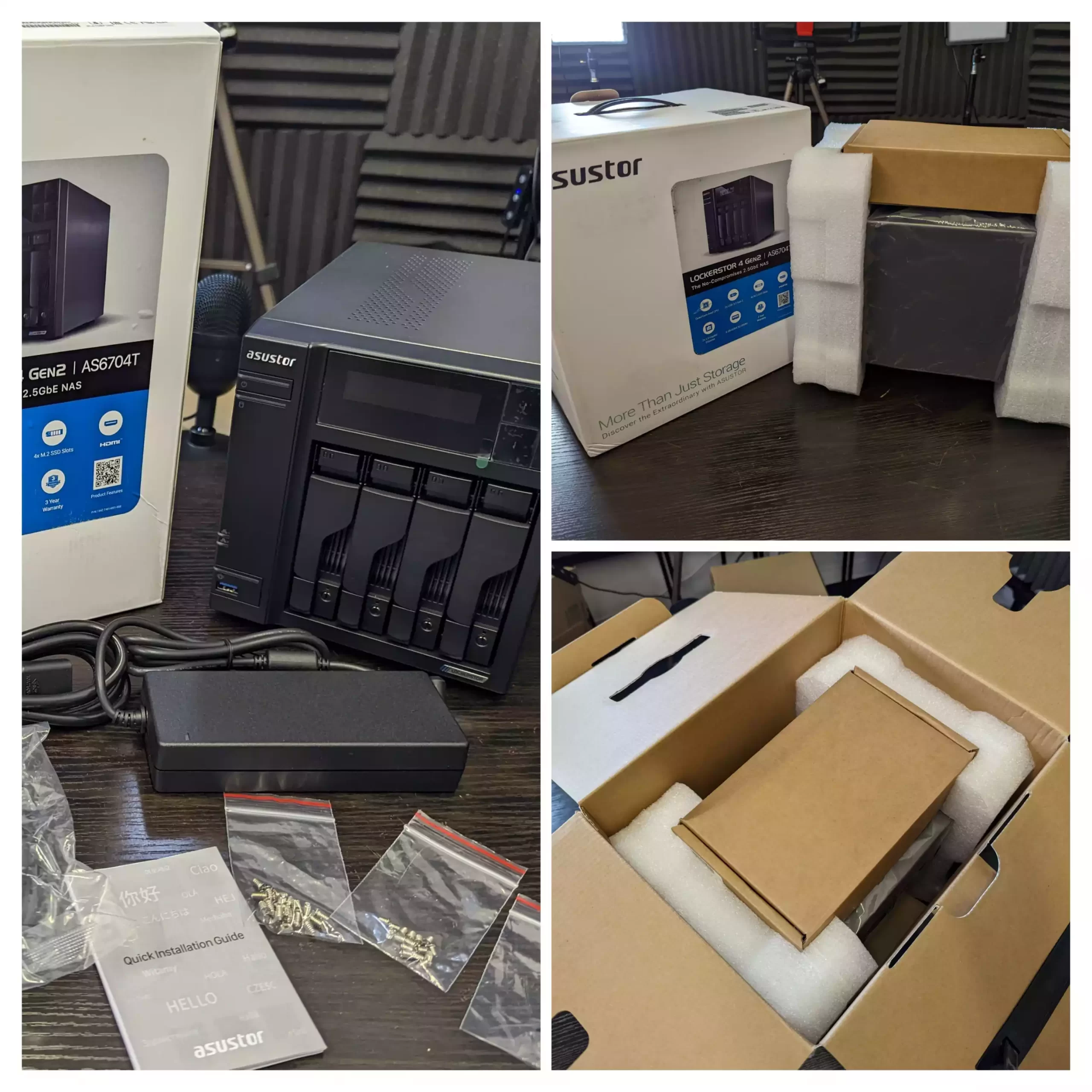
Upon opening the Lockerstor 4 Gen 2 retail box I’m pleased to confirm that the device is well packaged and partitioned for protection from movement and shock damage in transit, something that is wildly underestimated particularly in the field of data storage hardware. I know I tend to labour this point on YouTube, but silent tech damage is a real thing! I will always give a few extra points to any brand that puts their hand in their pocket and will pay for suitable protection of the unit in transit, as this is a shockingly overlooked area of this kind of technology on the basis that it is sold unpopulated.
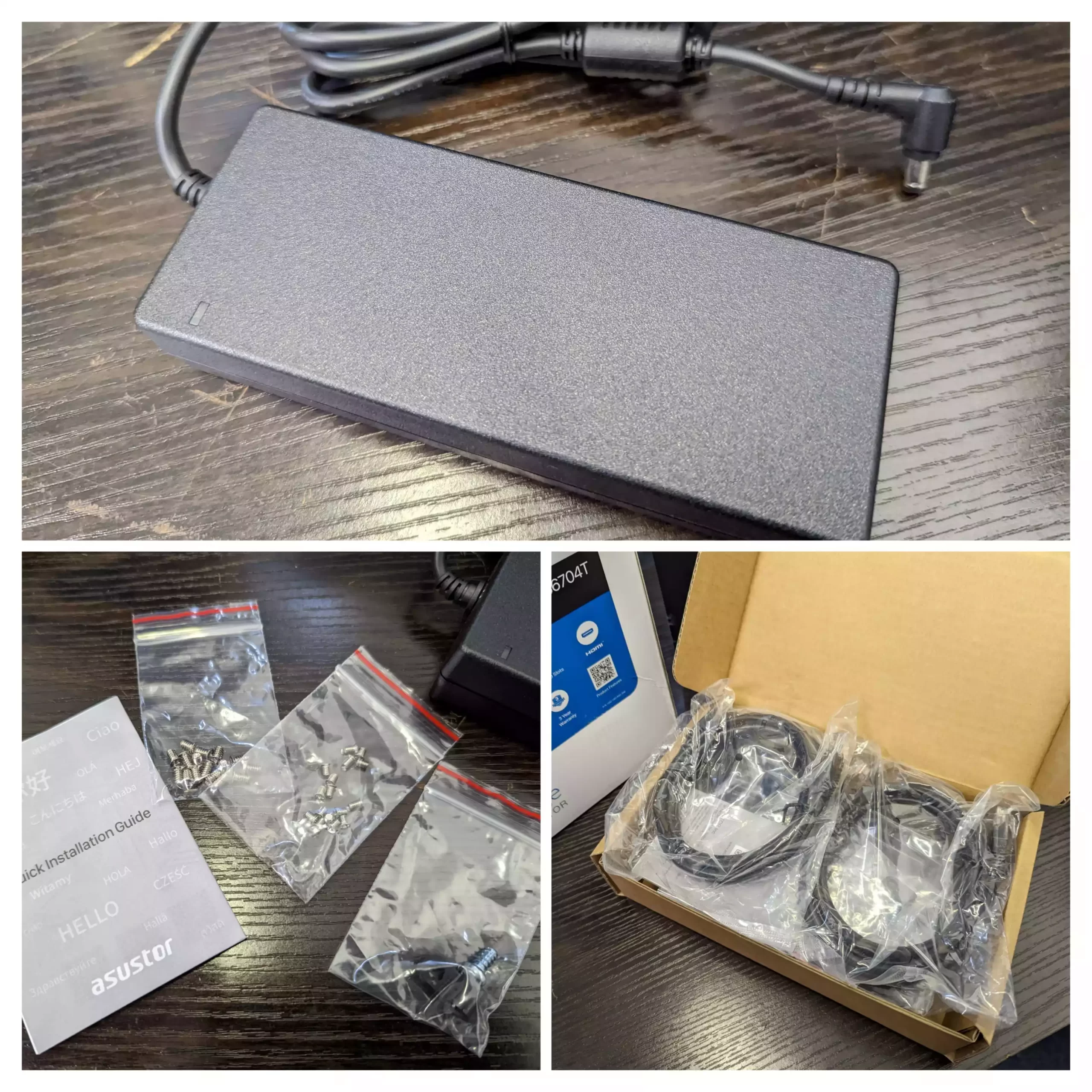
The full AS6704T Lockerstor 4 Gen 2 retail kit contains several items that allow you to deploy the device easily for the very first time. Everything you’re going to need is included here, apart from storage media, as the Lockerstor 4 Gen 2 is sold unpopulated. Asustor has always been in the practice of providing solutions without hard drives, so that end users can choose what media and to what extent they wish to populate their NAS on day one. This is, of course, a matter of taste and preference to the end-user, but generally, I always recommend unpopulated solutions, as it will allow you to plan your budget and spending requirements far more fitting to your requirements. The full list of accessories included with the device are:
- AS6704T NAS Unit
- 2x CAT 5e LAN Cables
- External PSU (90W) and Mains Power Cable
- Setup Guide and Warranty Details (3 Years)
- Screws for 2.5″ and 3.5″ media and keys
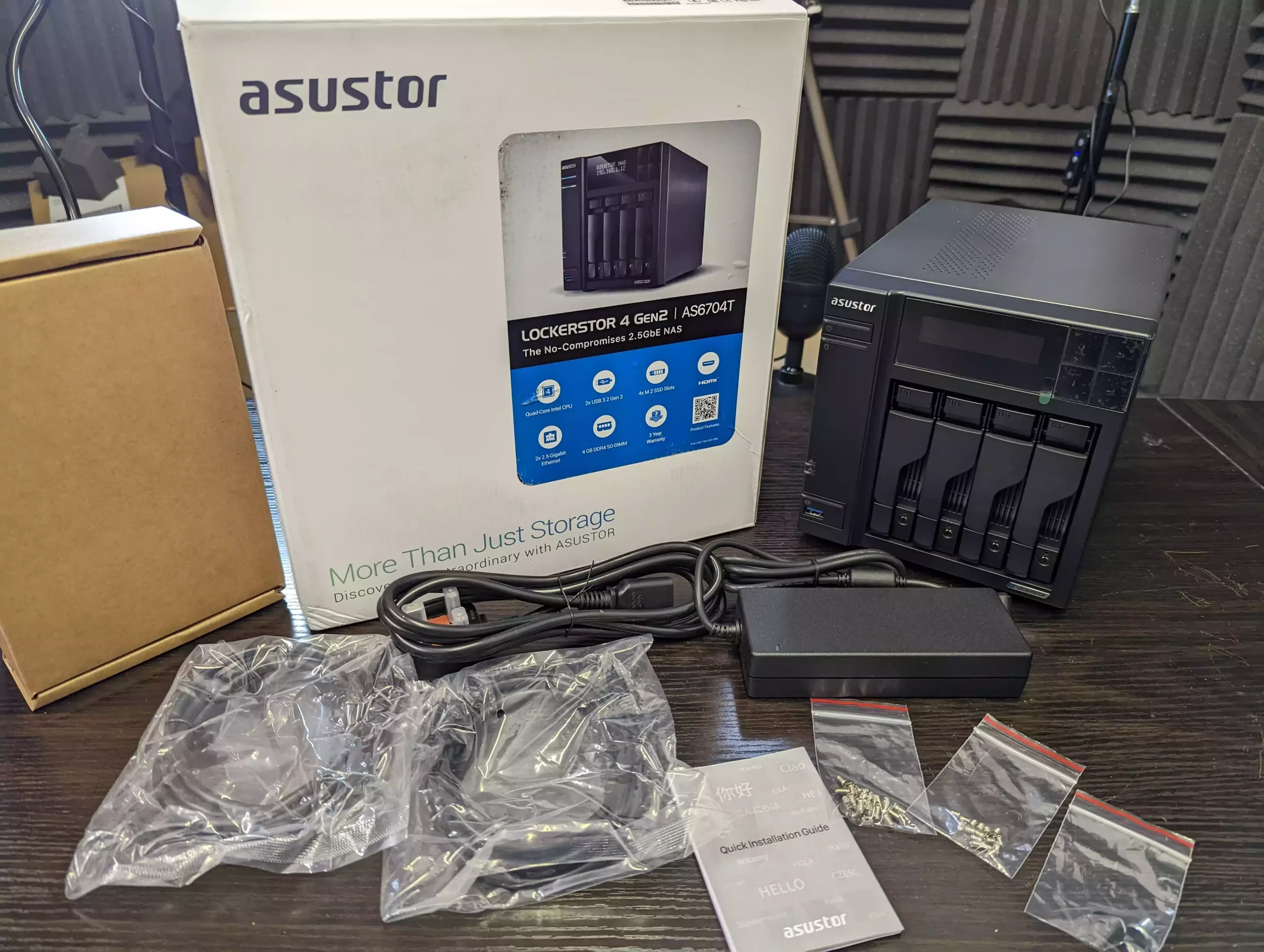
Most of these are fairly standard items, but there are a few elements of this accessory kit that I want to touch on. First up, the Lockerstor 4 Gen 2 arrives with an external power brick, which I know is an area of contention for some buyers who consider this just another thing to accidentally forget to pack when deploying a NAS in multiple locations. I have always been very much counter to this point of view, thinking that an external PSU makes a lot more sense in terms of ease of replacement in the event of failure and it also allows the NAS to not have to contend with additional heat generated from the PSU in this typically 24 X7 environment.
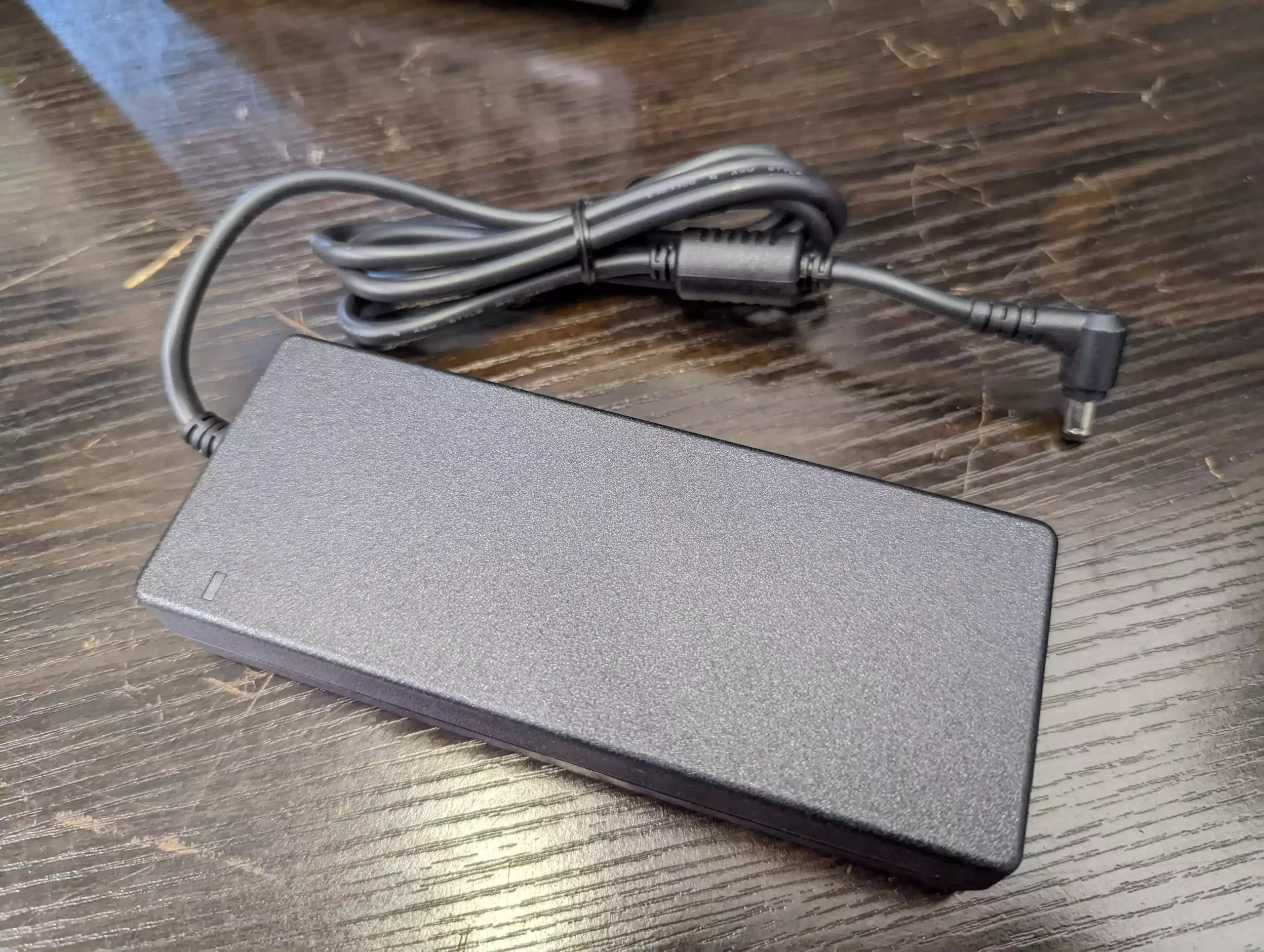
Additionally, the Lockerstor 4 Gen 2 arrives with to RJ45 network cables, one for each available network port. These are cat5e and therefore more than suitable for 1Gbe and 2.5Gbe. Now (and I will touch on this more later), the 4-Bay and 2-Bay in the Lockerstor series arrive with a PCIe upgrade slot that allows you to upgrade to 10Gb ethernet, so for that, scaling up to a Cat 6 would be advisable.
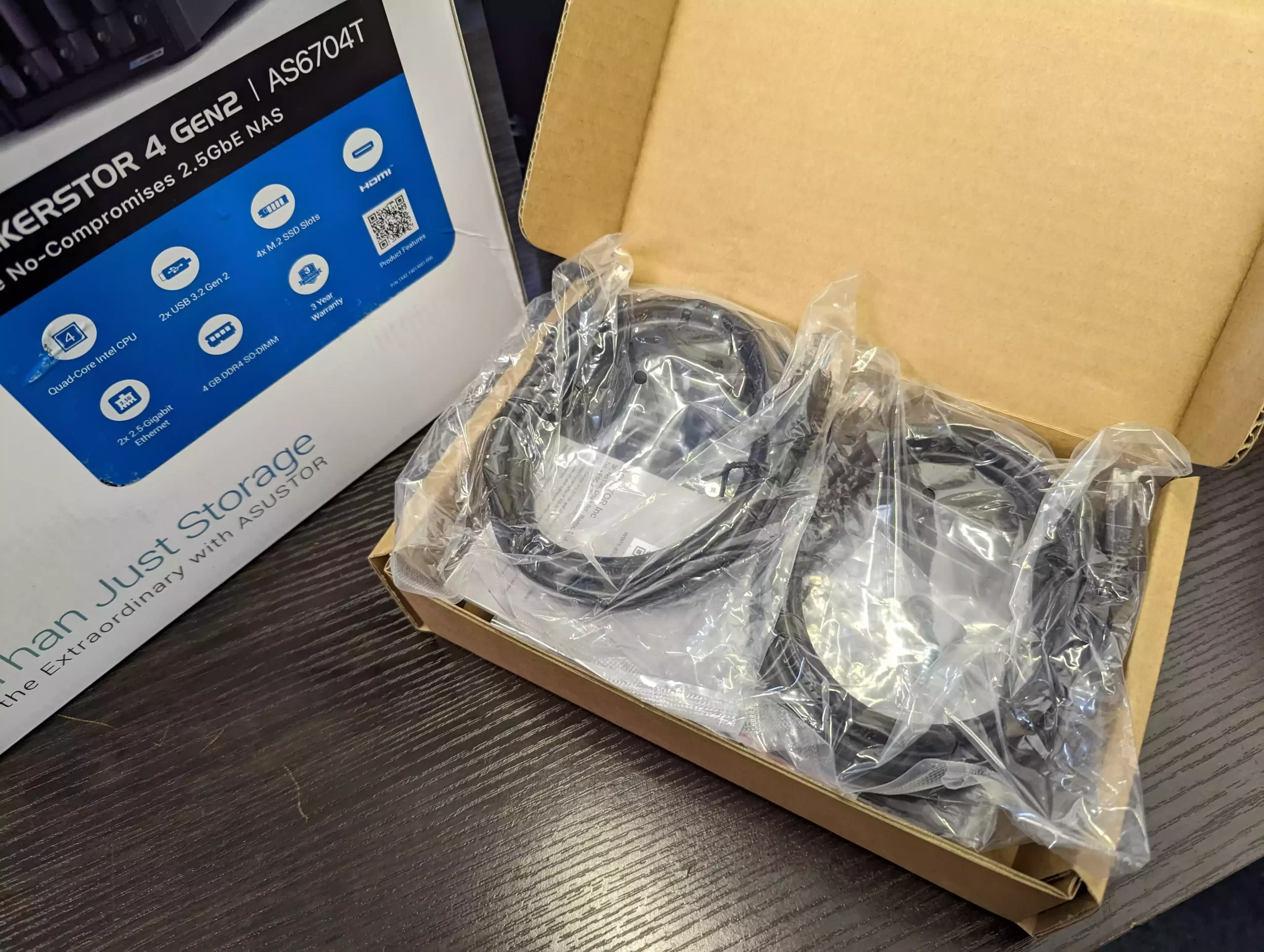
Finally, it is worth highlighting that the device also arrives with sets of hard drive tray keys, cable clips and screws for installing media into the Lockerstor 4 Gen 2. However, there was an absence of heat sinks for the m.2 2280 NVMe media bays. the Lockerstor 4 Gen 2 features four NVMe SSD cache bays (two more than the Gen 1 model and one of the big jumps that the Gen 2 Lockstor brings compared with it’s predecessor), however, I would have expected a couple of NVMe silicone or thermal heat pads included with this device. not a huge problem but just a minor thing I noticed worthy of comment. The other chassis does provide a little more ventilation over the area of the internal hardware where these M.2 drives would live, as well as provide a good amount of room for a 3rd party heatsink (as little as $10), but I am still a little disappointed that 2280 heatsinks were not provided, especially for the eventuality of these drives being used for caching. Overall I am quite happy with the Lockerstor 4 Gen 2 retail kit, despite the odd thing missed. However, I am sure many of you I’m more concerned with the build quality of this new Asustor NAS, so let’s crack on.
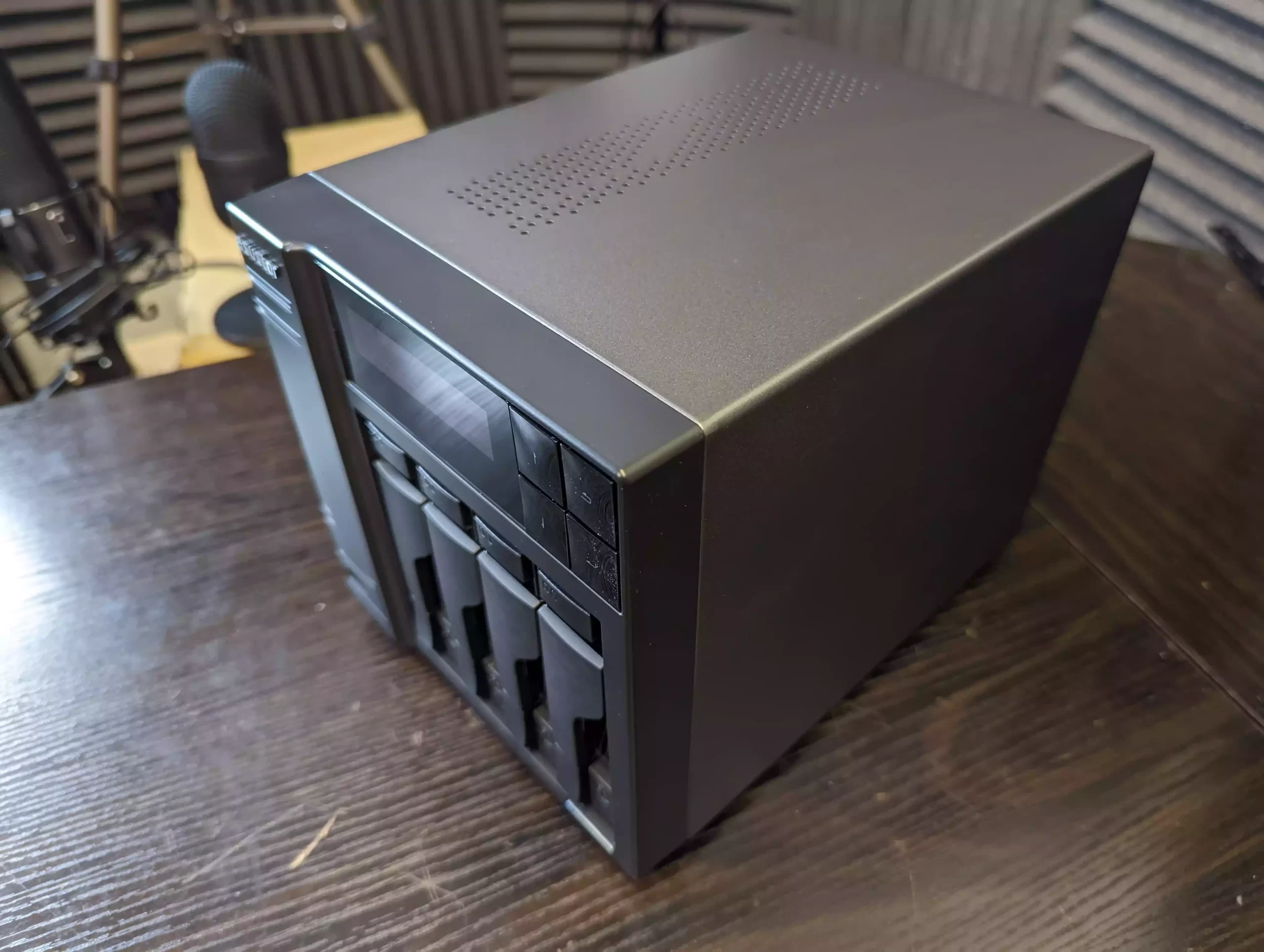
Asustor AS6704T Lockerstor 4 Gen 2 NAS Review – Design
The AS6704T NAS arrives in very unique and slightly old skool design. When many brands have dropped LCD panels in favour of simpler LEDs and metal screwed bays in favour of plastic click and load trays – Asustor has clearly stuck to their guns. Design-wise, the Lockerstor 4 Gen 2 AS6704T is IDENTICAL to the Lockerstor Gen 1 (with the only visible differences on the chassis at a glance being the added ventilation for the M.2 mentioned earlier). This 4-bay solution features a fantastically rugged casing, that is almost exclusively metal in both external casing and right the way down to the individual drive bays. Typically this is an area where most brands will make economies, for reasons of mass production or for reasons of noise reduction. However, I am well aware that there is a large contingent of NAS buyers who prefer metal NAS systems for added heat dissipation and build quality desirability. For those buyers, the Lockerstor 4 Gen 2 is a dream come true, indeed!
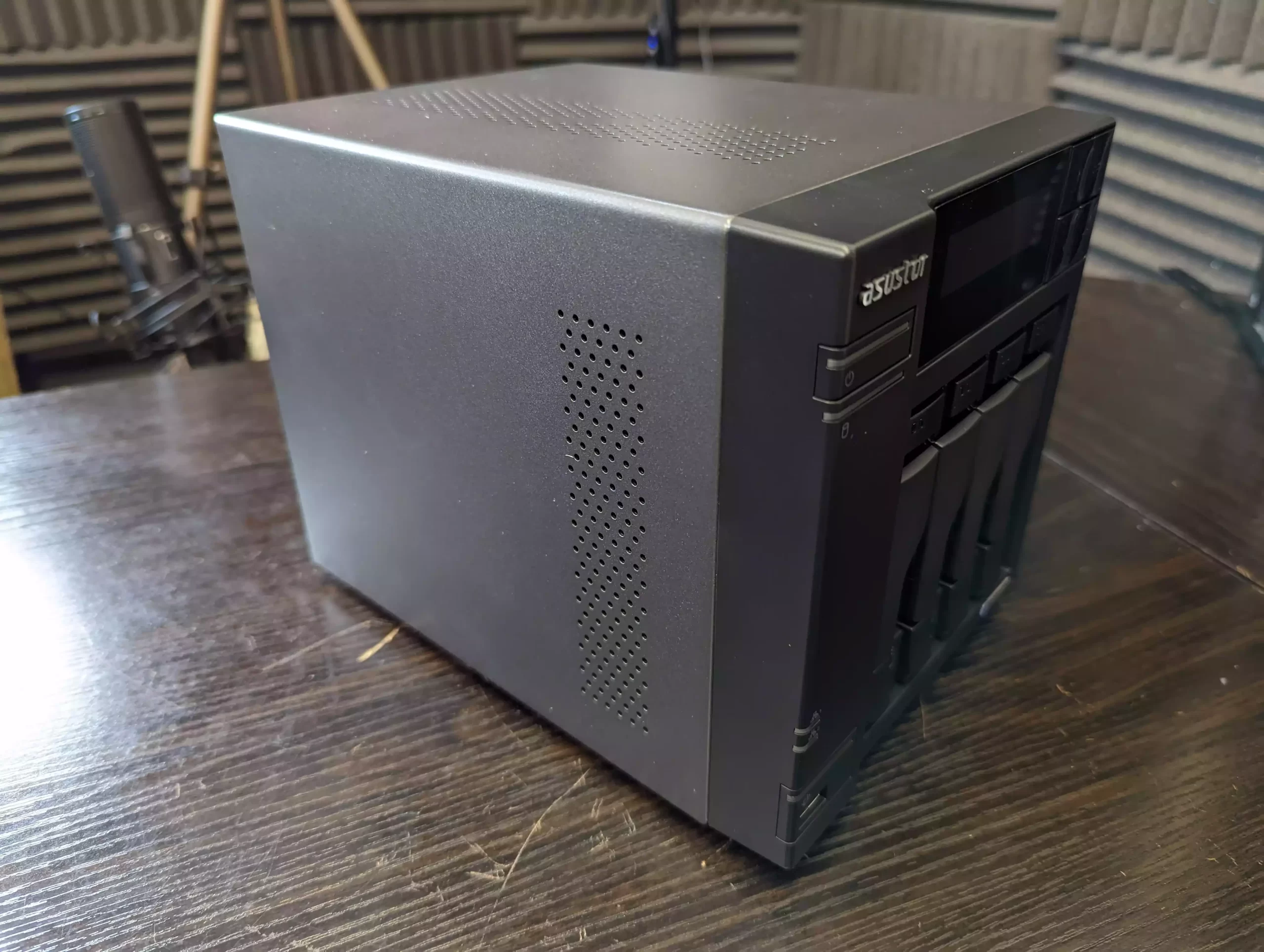
This 4-bay features a controllable LCD front-mounted panel that provides real-time information about the NAS when powered on. This information may appear a tad rudimentary, but there is no avoiding that it is useful if you need to know information such as the IP of individual network ports, state of internal temperature and details on notification warnings audibly triggered from the physical system at the touch of a button. Sure, you can access this information by logging in via the client applications or browser-based GUI, but this can take longer than a simple click of a button on the physical NAS and is especially relevant when the alert buzzer is triggered for reasons of storage degradation where the time frame is important.
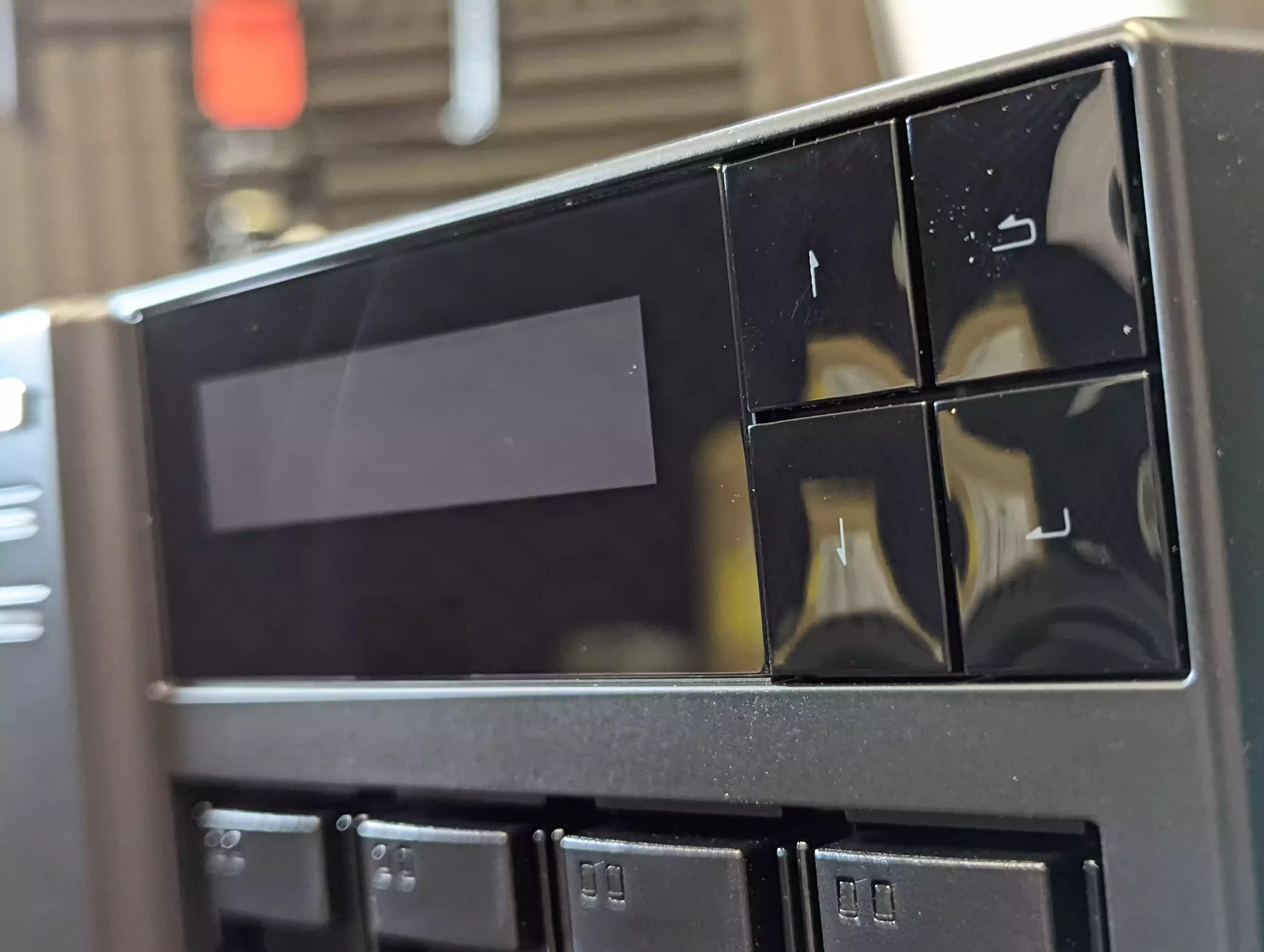
HOWEVER, a often overlooked fact of the Lockstor 4 NAS is that you can actually set the whole thing up with just the LCD panel – no desktop or model App needed! You can navigate initialization and single disk redundancy RAID configuration right from the first time power on via the LCD panel. Now, obviously, long-term access is going to be done with desktop/mobile client tools, however, for installers and/or IT Admins looking to quickly deploy these units, this level of fast setup is going to be remarkably handy. Equally, in the event of a system issue/warning (RAID degradation, high internal temperatures, disk health recognized in SMART tests, etc), the LCD panel allows you much MUCH faster means to identify the issue and address the buzzer/alarm than logging in via a client, going through authentication and more. This is especially handy if the issue is network connectivity related. Unsurprisingly, the Lockerstor 4 Gen 2 features numerous areas of LED notification. these are considerably less useful and detailed than the LCD panel but still provide minimalist information about system access and activity.
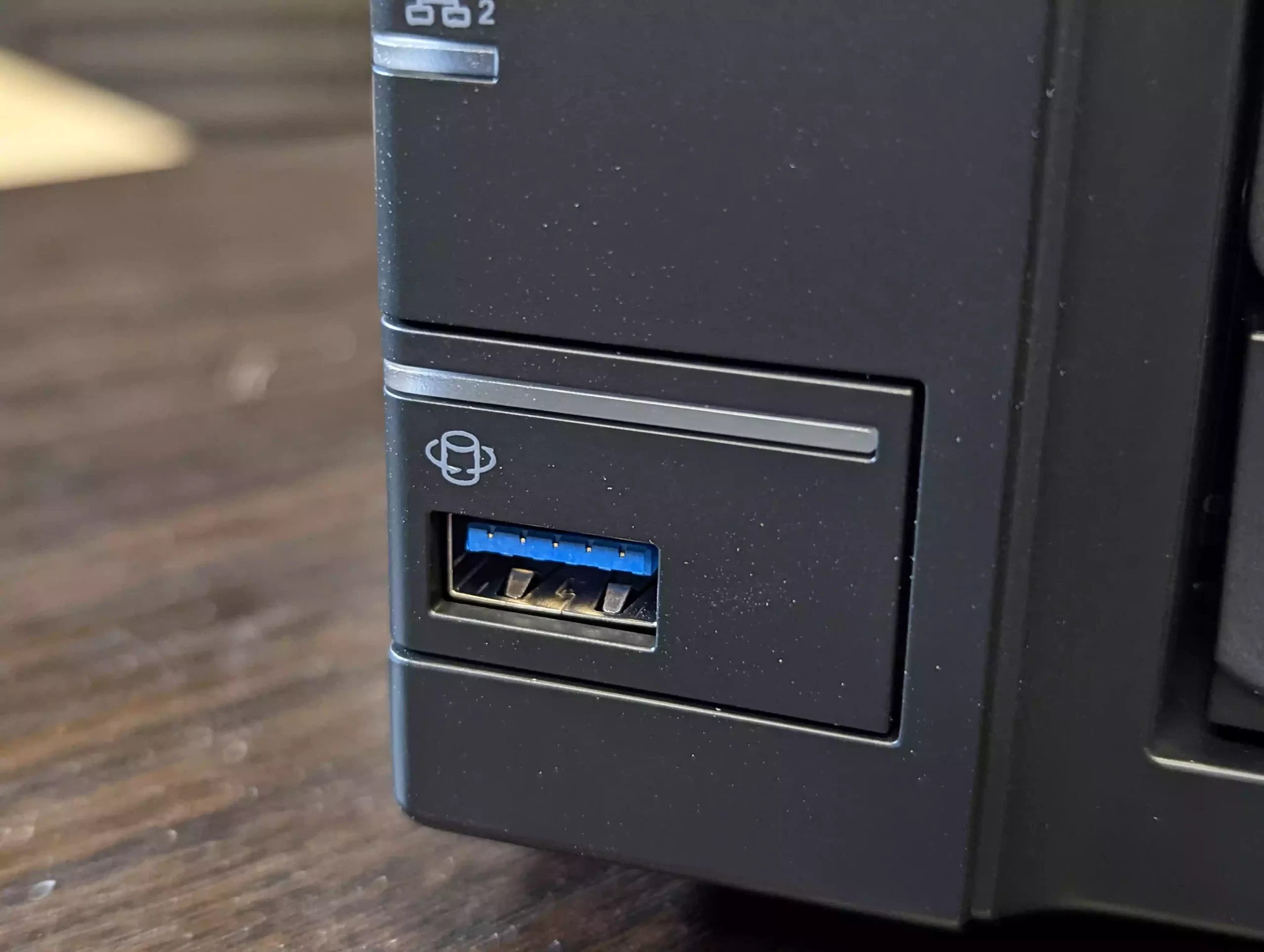
Another physical feature of the Lockerstor 4 Gen 2 that I’m pleased to confirm is still present in this 2022 NAS drive is a front-mounted USB port and copy button. Though in the case of the Gen 2 system, they have upgraded this to USB 3.2 Gen 2 (10Gb/s), so twice the locally connected bandwidth of its predecessor. More and more brands are removing this feature in favour of a stand-alone USB port that can trigger backups automatically when a given external drive is connected. The Lockerstor 4 Gen 2 has both a physical button that can manually instigate multiple types of NAS to USB backup, as well as an automated trigger system too – better to have both than either, as if you are going to the trouble of connecting a drive physically to this NAS the extra steps in assurance to simply click a button and the first-hand witness the backup begin is just an extra layer of peace and self-assured security that for me is vital, to have confidence in your backup strategy. Plus, the featured support of the USB 3.2 Gen 2 protocol means that you can take better advantage of external RAID storage drives and external NVMe SSD backup enclosures with a 1,000MB/s bandwidth to saturate!
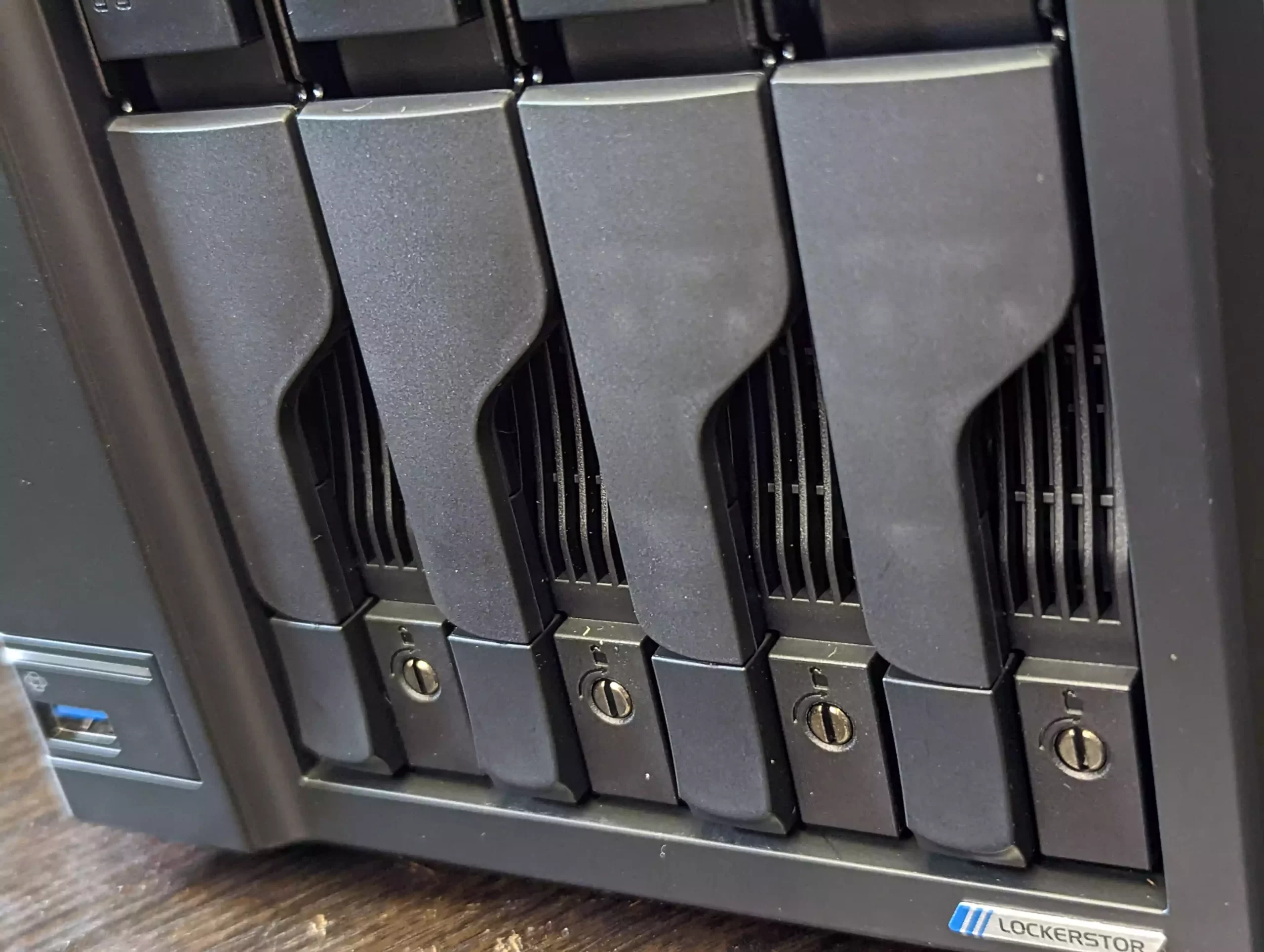
Carrying on with the theme of rugged design, the drive trays featured on the Lockerstor 4 Gen 2 are particularly good quality. Each tray has a dedicated switch-based locking mechanism, plenty of ventilation and is even spring-loaded, something we are seeing less and less these days. Each tray supports a 3.5-inch or 2.5-inch SATA media drive, as well as allowing you to deploy this device with a single drive if you choose. However, as these are metal trays, that is going to increase ambient noise when it comes to larger scale HDDs of 10TB and above (predominantly all 7200RPM, 7+ Platter and helium sealed – in other words, industrial and prone to noisy operation to start with).
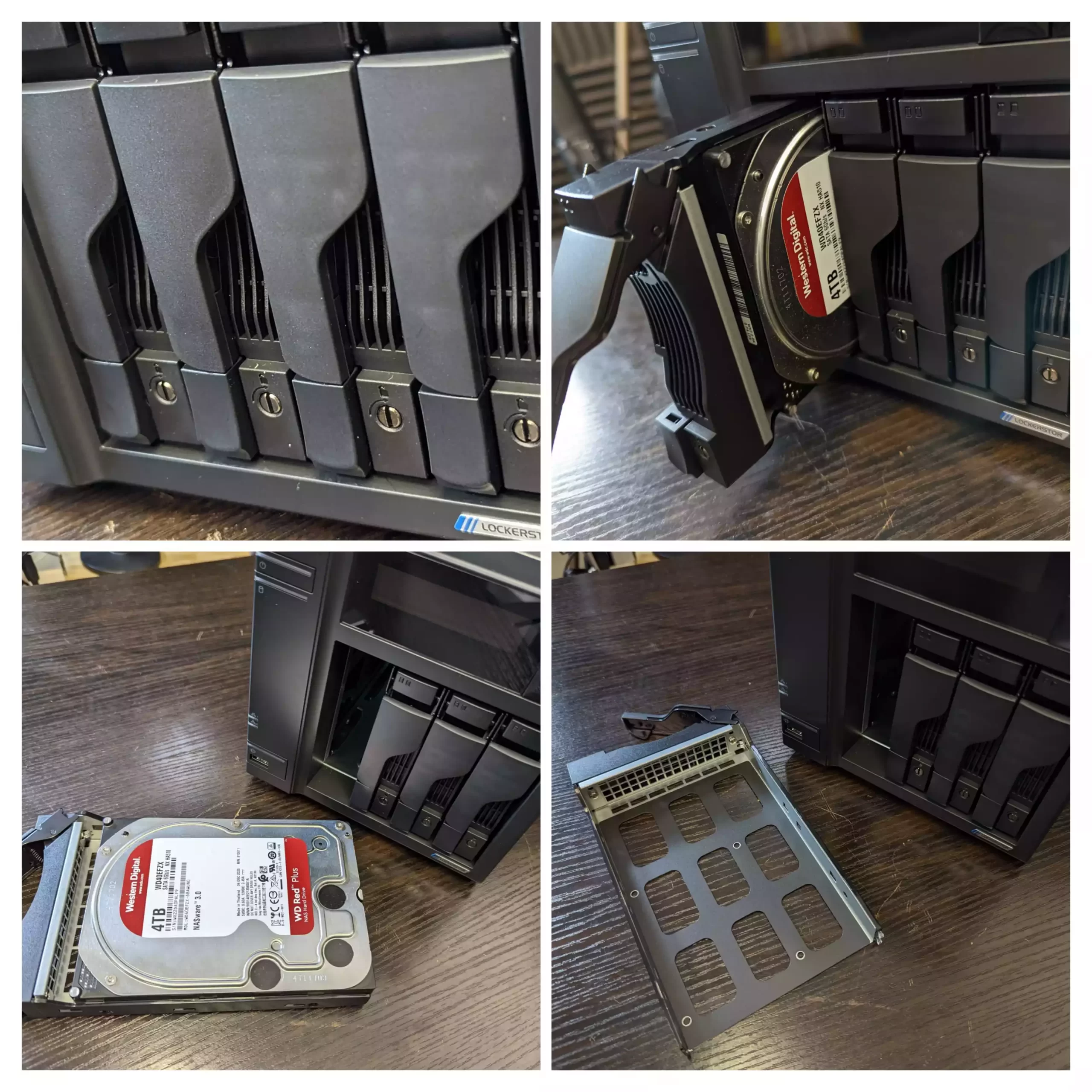
Of course, this device is designed with the utilisation of a RAID configuration ideally in mind and as this device supports both the very latest 20TB and 22TB drives, as well as numerous RAID configurations in JBOD, RAID 0, RAID 1, RAID5, RAID 6 and RAID 10. This means by current storage drive standards, this device can support up to 88TB of storage, and can even be expanded with an official Asustor expansion device over USB.
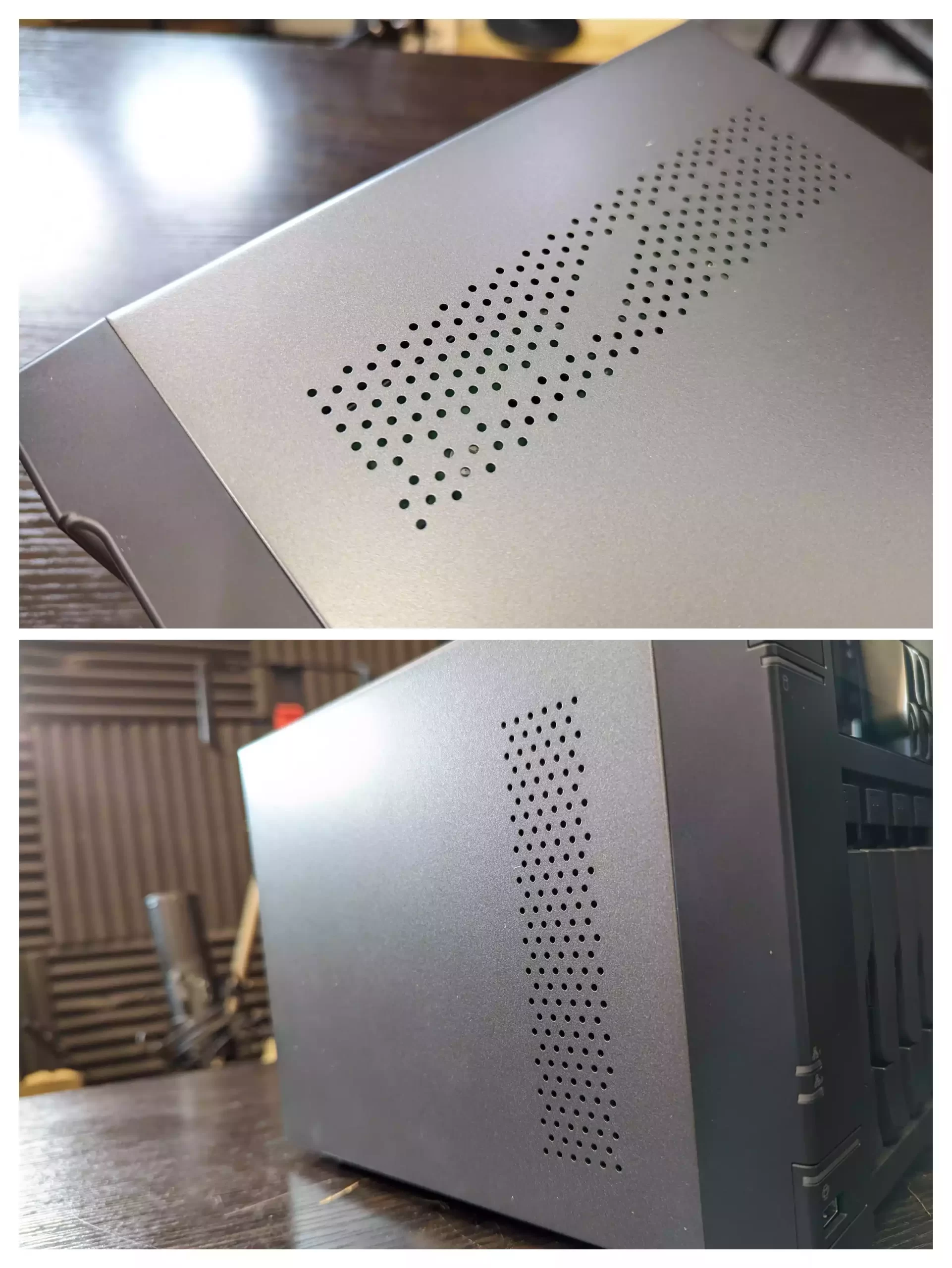
The abundance of metal design on the Lockerstor 4 Gen 2 nice will certainly assist heat dissipation, but there is no avoiding that it will also play its part in increasing general sound levels negatively. Alongside this, the Lockerstor 4 Gen 2 features less typically visible ventilation than what you see on most 4-bay solutions. Alongside the rear-mounted active cooling fan, the only other passive cooling to assist airflow is via a minimal ventilation slit on the side and what ventilation is available on each drive tray. Once again, this system requires a little less ventilation than more plastic-based NAS casing and is therefore excusable to a degree. Next, we discuss the ports and connections available on the Lockerstor 4 Gen 2
Asustor AS6704T Lockerstor 4 Gen 2 NAS Review – Ports and Connections
The ports and connections on the rear of the Asustor Lockerstor 4 Gen 2 AS6704T NAS are comparable to that of the original Lockerstor 4 (AS6604T) from 2020, but a few tweaks for the new refresh have definitely been made. That said, one thing that has remained between the revisions is the inclusion of 2.5GbE connectivity (Asustor were the first to unveil commercial 2.5GbE NAS right the way back in 2019 with the Nimbustor series).
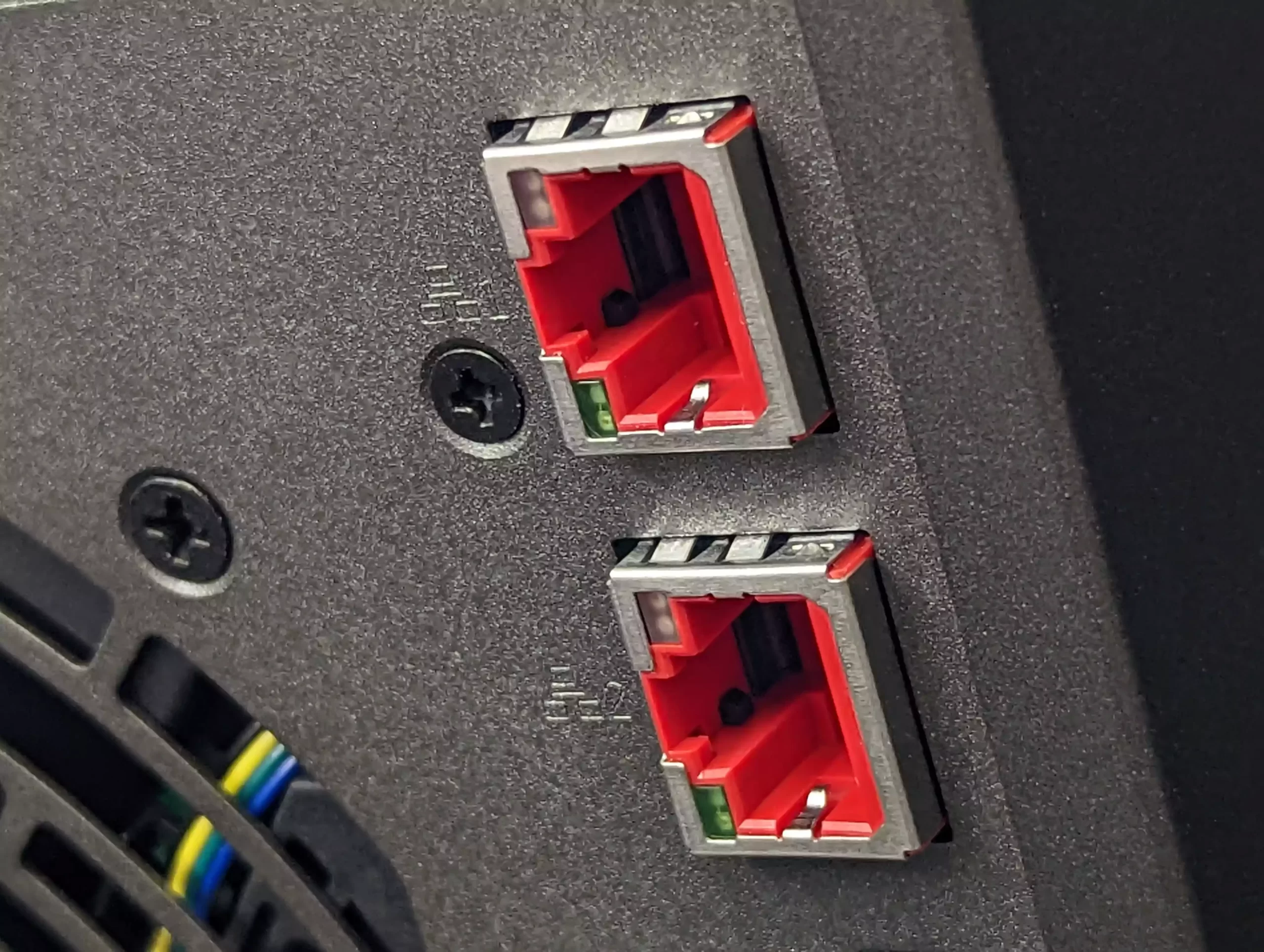
These Ethernet connections, both of which feature 2.5GBASE-T/Coppe (2.5x that of traditional ethernet speeds) allow you a much better opportunity to fully take advantage externally of that RAID of HDDs inside. Additionally, these ports can be combined (via link aggregation/port trunking) to allow up to 5 Gbe combined bandwidth. There are, of course, numerous factors to consider before reaching these speeds such as making sure the rest of your network environment is 2.5Gbe and above compatible, as well as the storage media inside providing that level of performance. However, it is still impressive that the Lockerstor 4 Gen 2 can arrive at the same price as the Synology DS923+ NAS with its 2x 1GbE connectivity, yet still arrived with some great prosumer hardware.
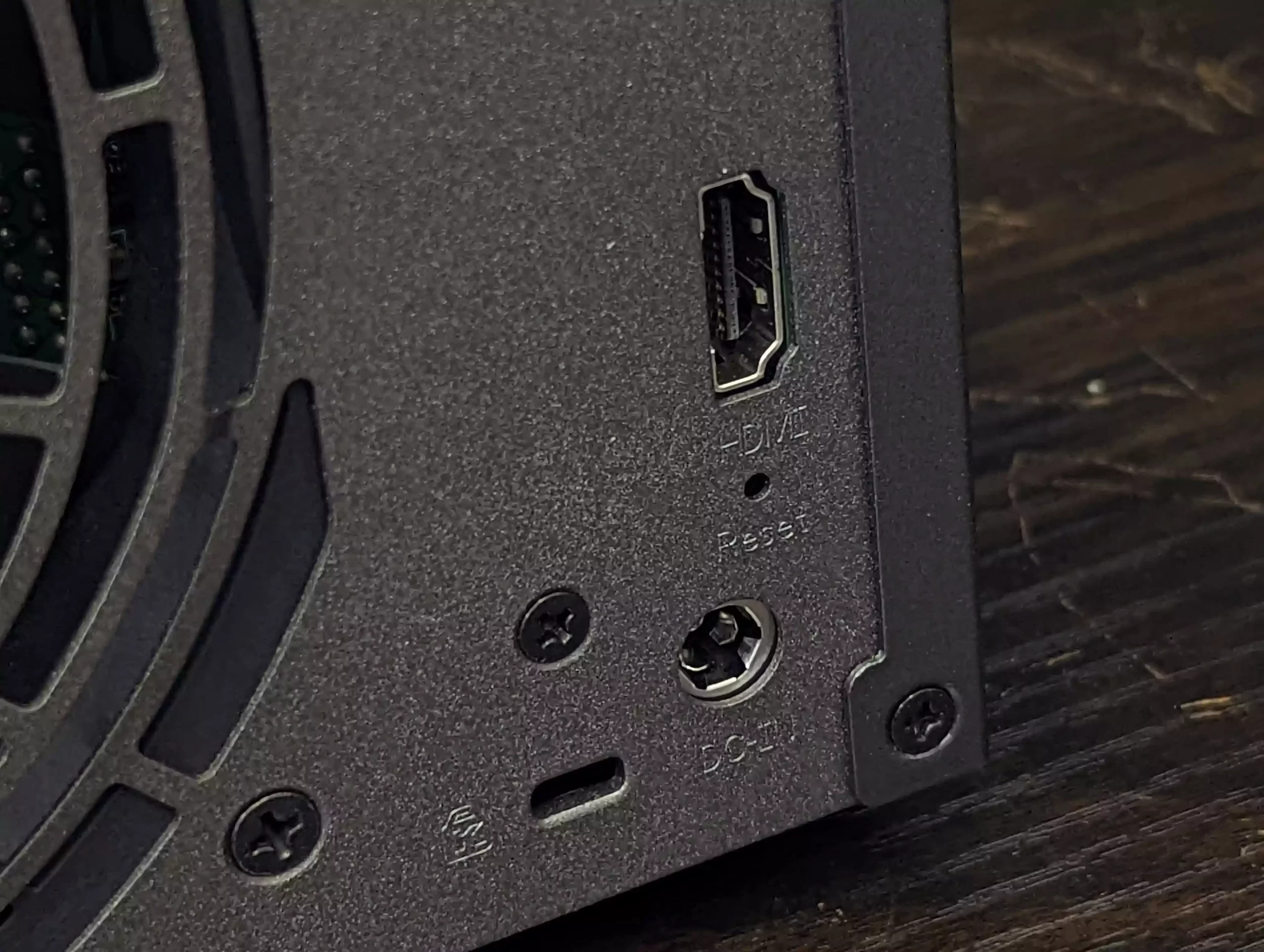
Additionally, this system also features an HDMI out that can be used in unison with the dedicated parallel GUI, Asustor portal. This separate user interface and means to interact with the data on your NAS in a far more graphical level is something currently only QNAP provides. The visual out used in conjunction with the two additional USB 3.2 ports opens up numerous KVM (or keyboard video mouse) applications, such as a stand-alone surveillance system, a stand-alone desktop computer used in conjunction with the virtual machine software, direct output of your movies and box sets from your collection, a retro arcade machine with support for controllers and numerous other first and third-party software options.
Additionally, the Lockerstor 4 Gen 2 has scaled things up over the previous model by adding HDMI 2.0b, which is a 4K 60 frames per second visual output, but also is much more efficient at handling HDR and SDR using available available bandwidth. That means that you will be able to enjoy particularly dense 4K top-end media with close to zero playback and browsing latency time, by connecting the NAS directly to your TV, as opposed to streaming such large media over the network.
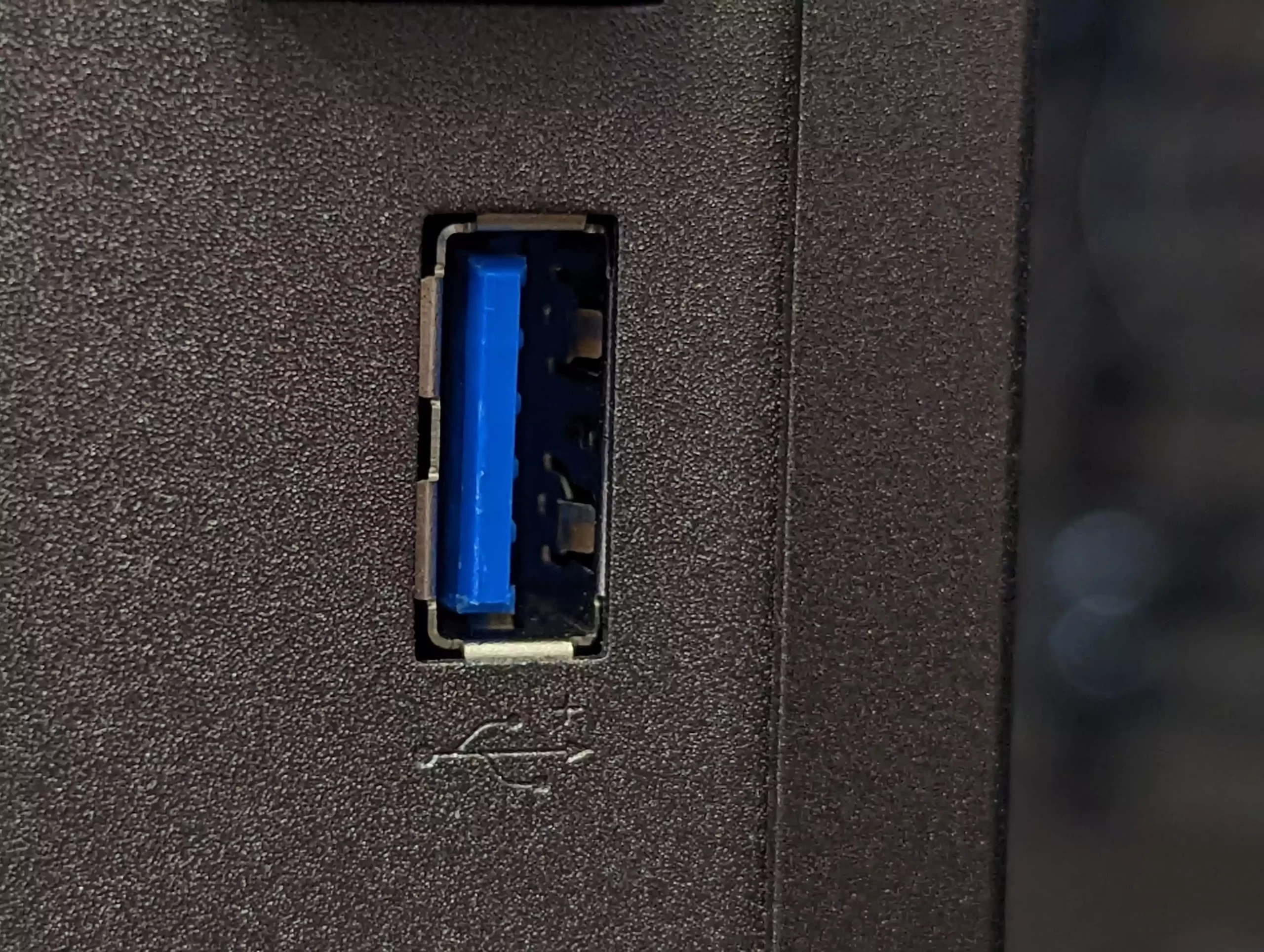
The USB 3.2 Gen 2 ports that are featured on the Lockerstor 4 Gen 2 can also be used by numerous supported hardware peripherals and storage devices by the core NAS system, such as UPS devices, printers, expansion chassis, remotes, external storage and wireless dongles. There are even 2.5Gbe and 5Gbe USB adapters that allow you to add further network interfaces to this NAS and increase the available bandwidth to multiple users(and apps) accessing the data on the lockerstor NAS for their own needs. The 4x SATA Bays and 4x M.2 NVMe SSD Gen 3 Bays are going to provide a tremendous level of throughput, which those two 2.5GbE ports and the option to add two more 2.5/5GbE connections via USB will go a long way to externally support. But that is not the only option in this 4-Bay NAS.
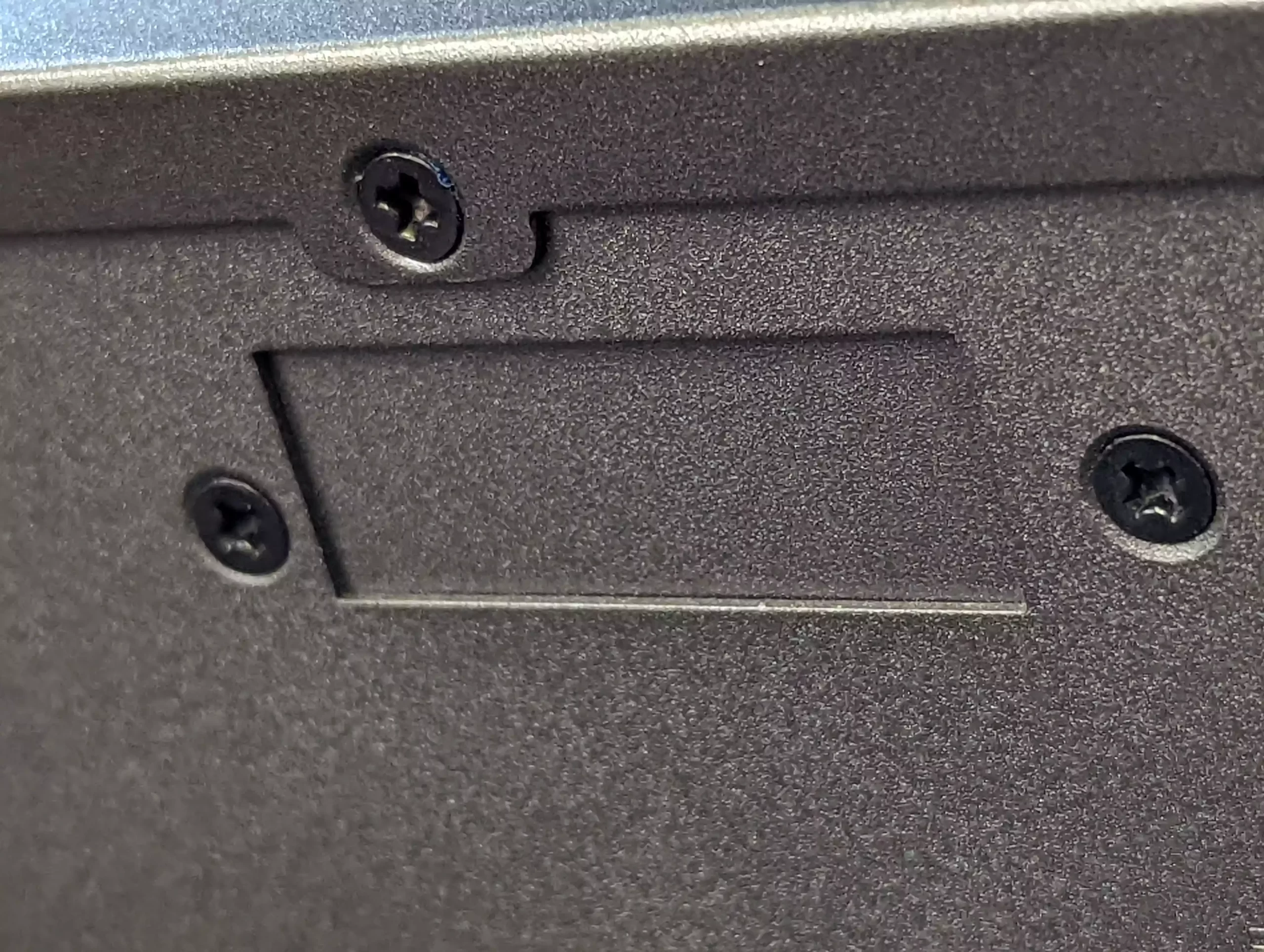
The lockerstor 4 Gen 2 NAS also has a PCIe Upgrade slot that allows you to install Asustor’s AS-T10G2 10GbE upgrade card and add ANOTHER 1,000MBs (10Gb) external connectivity to your total network bandwidth on offer! So, once again, we are seeing a whole bunch of upgrades in the Lockerstor Gen 2. Let’s move onto the internal hardware that is on offer with this system.
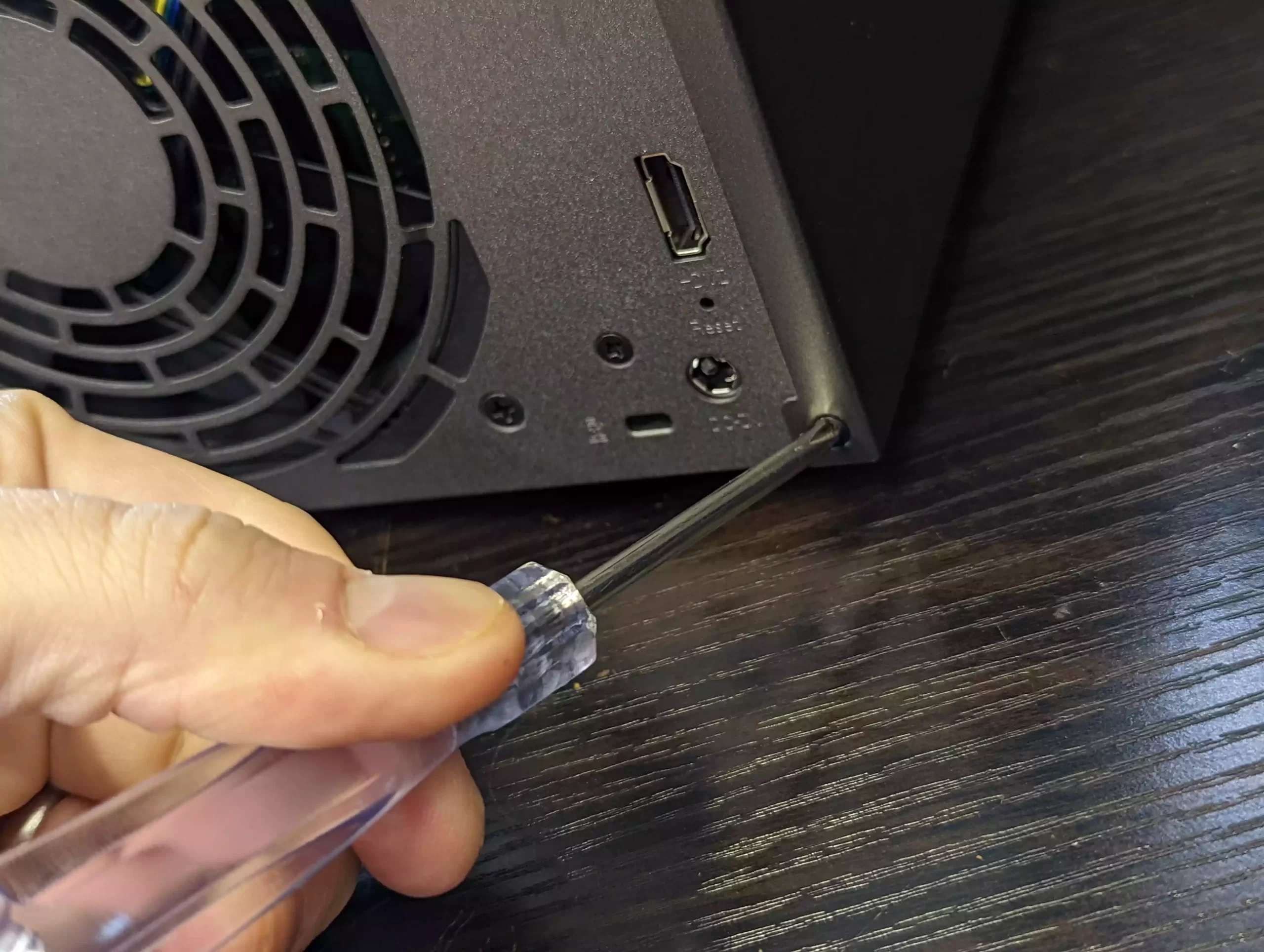
Asustor AS6704T Lockerstor 4 Gen 2 NAS Review – Internal Hardware
Much like its predecessor, once I removed the external casing of this NAS drive, we find that the bulk of the main controller PCB is covered by a layer of heat-reflective plastic. Under this, we find the main CPU and memory of the Lockerstor 4 Gen 2 system.
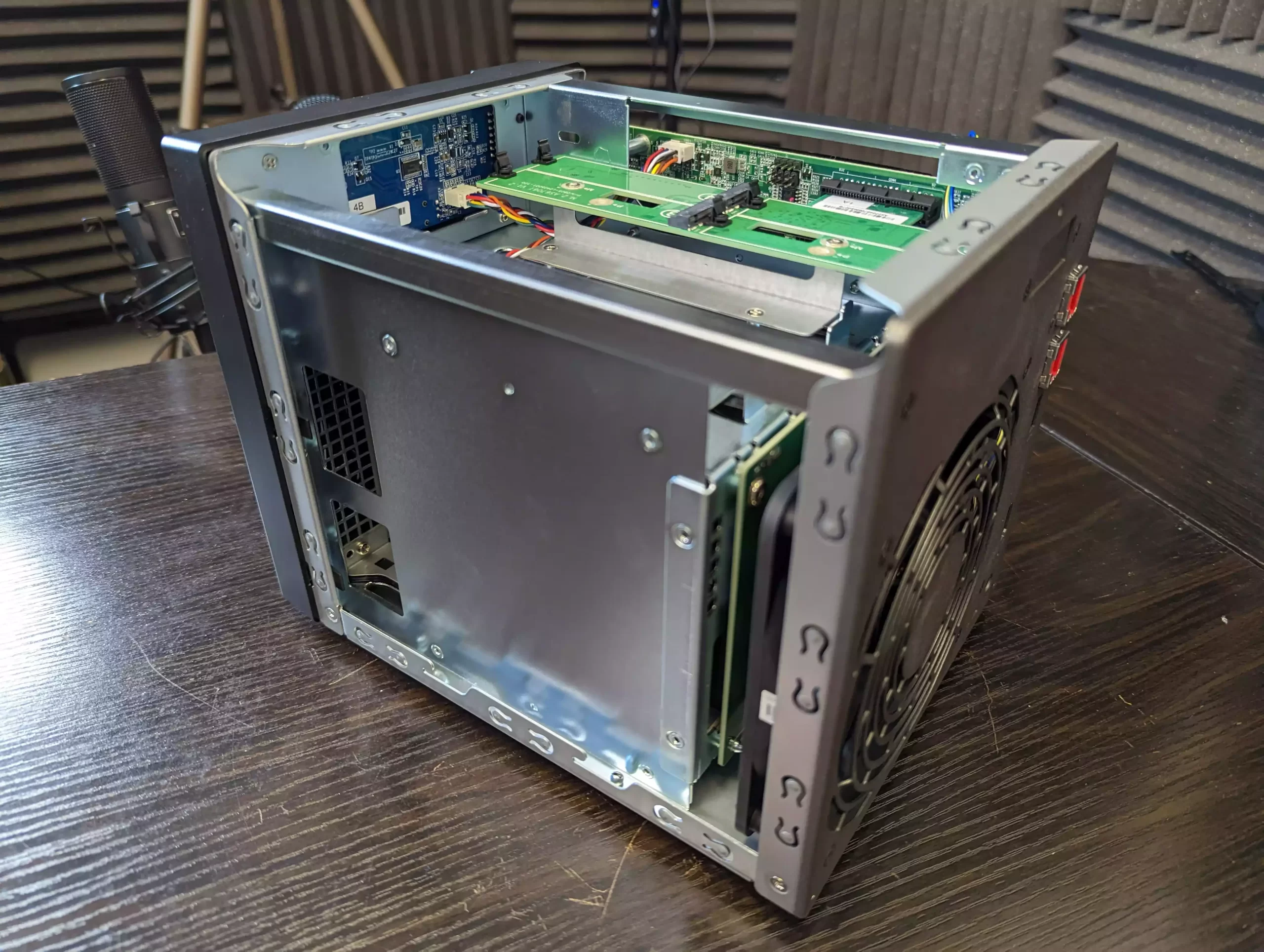
The CPU featured in the Asustor Lockerstor 4 Gen 2 NAS has scaled up from the Intel J4125 in its predecessor to the much newer Intel Celeron N5105, a processor that has become exceptionally popular this year in most mid-range NAS solutions with its excellent price vs featured chipset support. This has become especially true since some brands have started moving away from integrated processors like the Intel Celeron series and switching to more traditionally ‘file processing’ focused chips. The presence of a Celeron in the Lockstor Gen 2 will be of particularly good news to those who take advantage of Plex media server and similar (Emby, Jellyfin, etc) to playback denser HEVC/H.265 media and are reliant on client-side conversions. This CPU features a 2.0Ghz clock speed that can be upped to 2.9Ghz when needed, on each of the 4 cores.
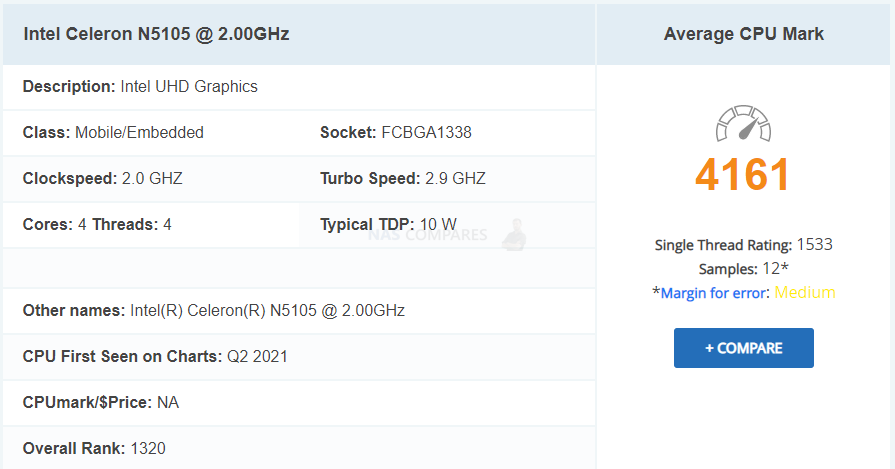
This CPU also allows the Lockerstor 4 Gen 2 to take advantage of fast and large quantity memory when compared to the Gen 1, with this NAS arriving with 4GB of DDR4 SODIMM 2933Mhz memory that can be upgraded to 16GB as needed. For those running larger camera/surveillance operations, VMS and containers or larger-scale sync tasks, this will be great news!
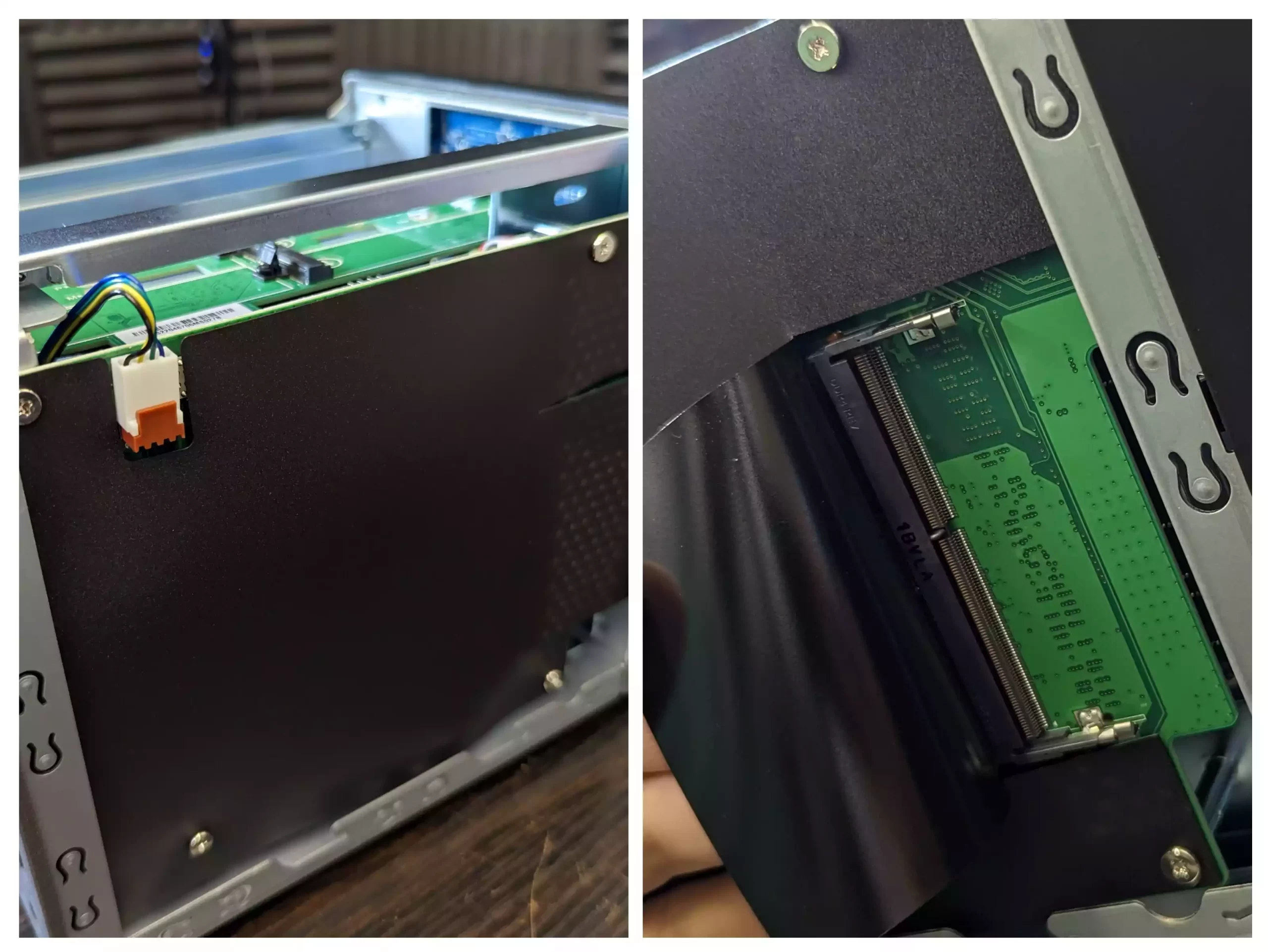
Then there is possibly one of the most popular hardware upgrades in the Lockerstor Gen 2 over the Gen 1, the inclusion of FOUR M.2 NVMe SSD slots. These can be partially or fully populated with M.2 SSDs of upto 2280 length and are Gen 3 in architecture. I am still investigating if it’s PCIe 3×1 or 3×2 (I suspect the former, given the scale of hardware here that is running on this architecture/chipset).
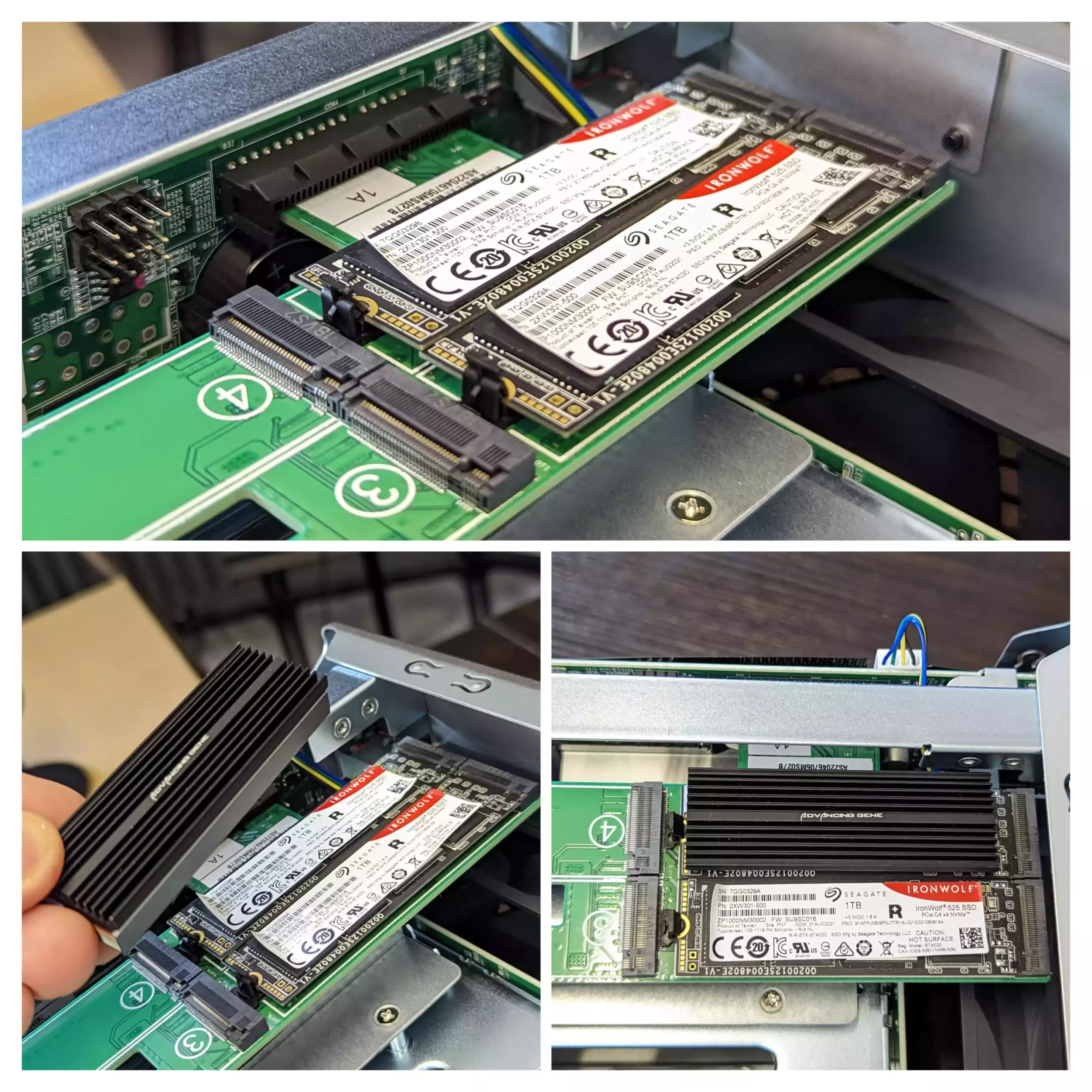
Now, this means a possible bandwidth of 1,000-2,000MB/s. This does present the tiniest bottleneck when connecting more modern PCIe Gen 3 x4 NVMes (Seagate Ironwolf 510s, Samsung 980 and WD Black SN750 for example) that can hit 3,000-3,400MB/s at peak, but you will still see great performance benefits (particularly in file operations that require smaller and more frequent files in high quantities) and the benefits of SSD cache used in conjunction with a larger more cost-effective hard drive RAID array have long been established. However, it is worth highlighting that unlike the Synology flagship four-bay series’ (DS923+ and DS920+), the NVMe SSD that you install inside the Lockerstor 4 Gen 2 can be used for both SSD caching or as raw storage pools (either for a faster container of storage, for the Asustor ADM system software or for individual apps).
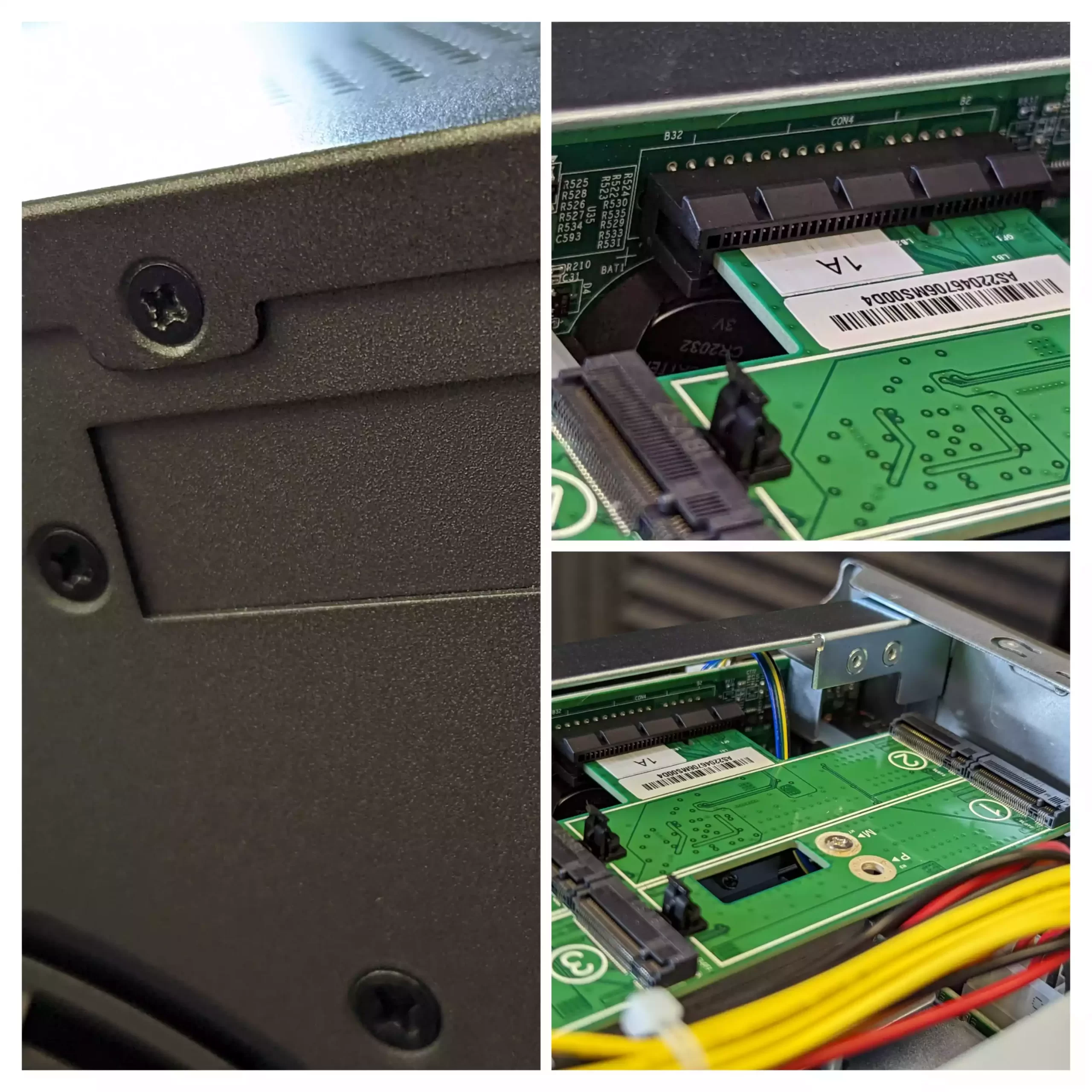
HOWEVER! It is worth keeping in mind that the 4x M.2 NVMe SSD slots that the Asustor Lockerstor 4 Gen 2 has are on a separate PCIe board that is connected to the main board via the PCIe upgrade slot. That means that you will need to choose between the 4x m.2 NVMes or 10GbE official Asustor upgrade card. There ARE combination 10GbE and M.2 SSD cards in the market, but their compatibility with the Asustor platform is still TBC.
In performance testing by Asustor, using four SATA IronWolf SSD 110’s, the system was easily about to fully saturate the two 2.5GbE ports (in Link Aggregation), hitting performance of 590MB/s seq Read and 591MB/s seq Write. Even with domestic class or Pro series hard drives, you would almost certainly see the exact same level of network saturation.
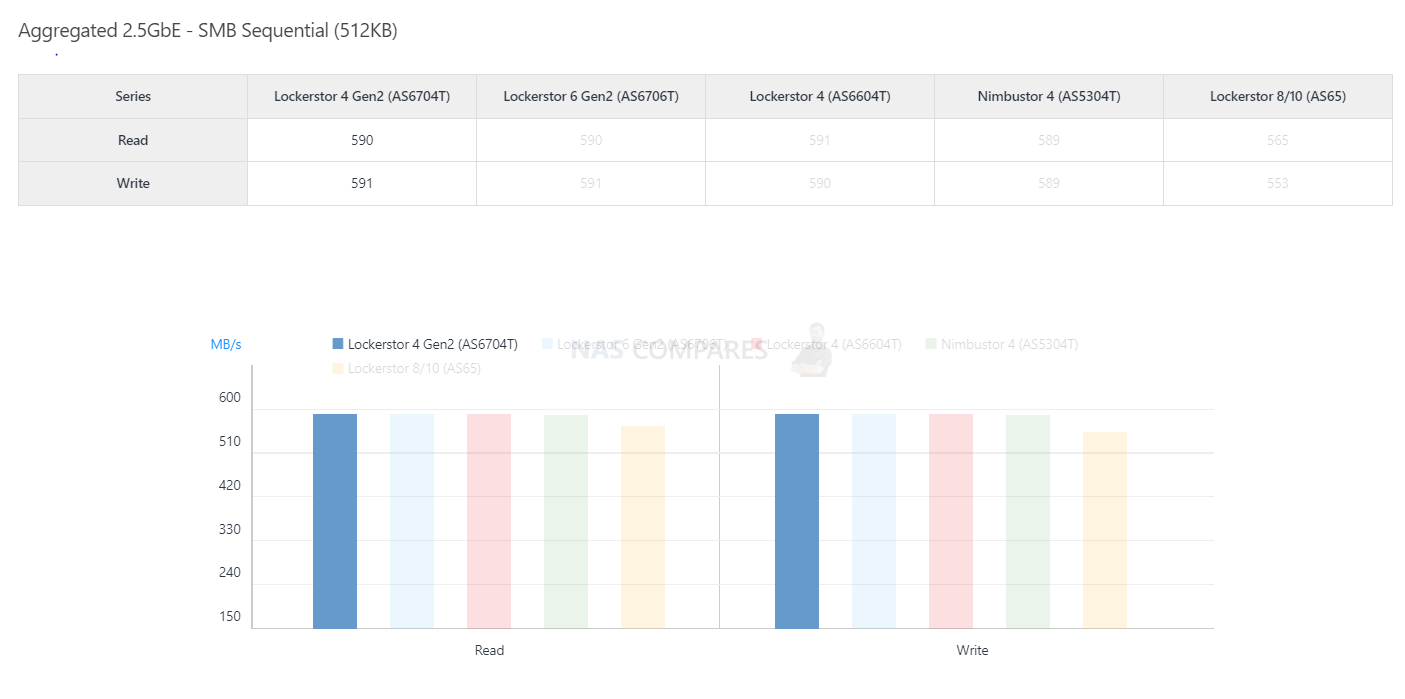
In terms of 10GbE performance over a single 10Gb file (when using the AS-T10G2 network upgrade card), the results are a little less clear. Asustor reported the Seq Read performance clearly maxing the bandwidth at 1,117MB/s, but Seq Write at just 627MB/s. Now, this could be a number of smaller factors (using SATA storage bays in a RAID that tend to only increase performance incrementally by 150-200MB/s a drive, or the Intel Celeron inside being less file service optimized – (see my video discussing the AMD Embedded Ryzen vs Intel Celeron family here). Still, these are still quite reasonable numbers for a 4-Bay NAS and if you were to factor in the 4x M.2 NVMe SSD Bays (future video), then I think we would comfortably see much higher numbers!
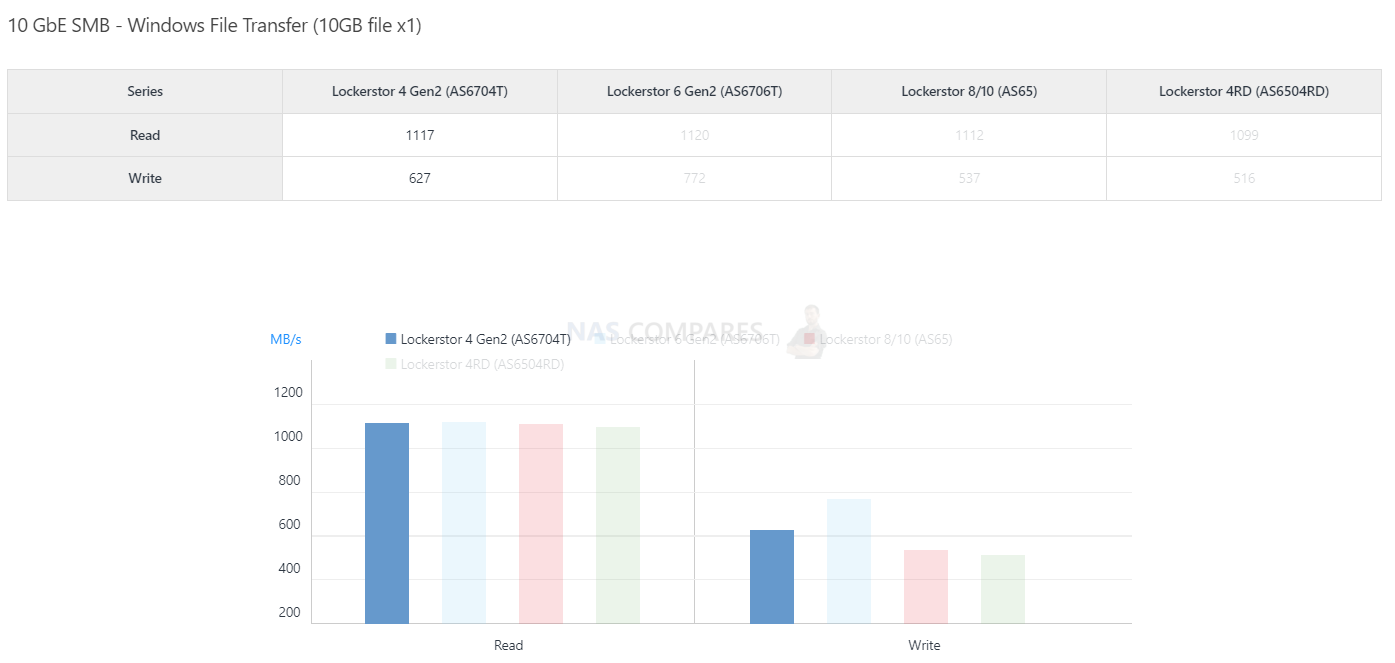
Overall, the hardware that is on offer here with the Asustor AS6704T NAS is very good for the money and is a decent upgrade over the Gen 1 Lockerstor. However, a NAS is a combined hardware and software packaging and we need to go into more detail on ADM, the system software and services that are bundled in with the Lockerstor 4 Gen 2.
Asustor AS6704T Lockerstor 4 Gen 2 NAS Review – Software
The Asustor AS6704T NAS arrives with the latest version of ADM included. Additionally, this software receives frequent updates to ensure that the software runs the very best it can on the Lockerstor, as well as keeping up to date with security patches and application versions. The NAS software is accessible via a web browser and displayed very much like a normal computer operating system (desktop, user accounts, customizable themes, file management, running multiple tasks in windows that can be switched in the native tabs), but there are also a range of desktop client tools for accessing the NAS on your local machine natively, as well as a whole bunch of mobile applications that allow tailored access from your phone/tablet in more task-specific means (eg a photo app for viewing pictures and creating phone backup routines, a video app for enjoying your movies and boxsets, surveillance app to access your cameras, etc). There is also a large range of support of 3rd party applications too in the ADM platform. Asustor is not as big a company as the likes of Synology and QNAP, whole put ALOT more money into their software development, but Asustor try to counter this by (when they do not have an in-house app) making native versions of 3rd party tools in their platform (example, they do not have a 1st party Virtual Machine app, but DO include huge support for VirtualBox). The platform is not quite as fully featured as DSM and QTS, but it is still a very smooth and accessible software platform. The app center has a few more 3rd party applications and slightly crowbarred software (eg the Amazon Media and Streaming service plugins) that is not updated up the original uploaders anywhere near enough (leading to running issues on these tools), but the 1st party apps run very well. The big takeaway on the Asustor software and it’s services is that the standard class of expected features of a modern NAS in 2022/2023 are here and run exactly as you would want, it is just some of the additional ones that other platforms have doubled down on (such as AI-related services in Photography and Surveillance for example) that are a little lacking. That said, the brand has definitetl ramped up a number of the key security protocols and settings in the default setup.
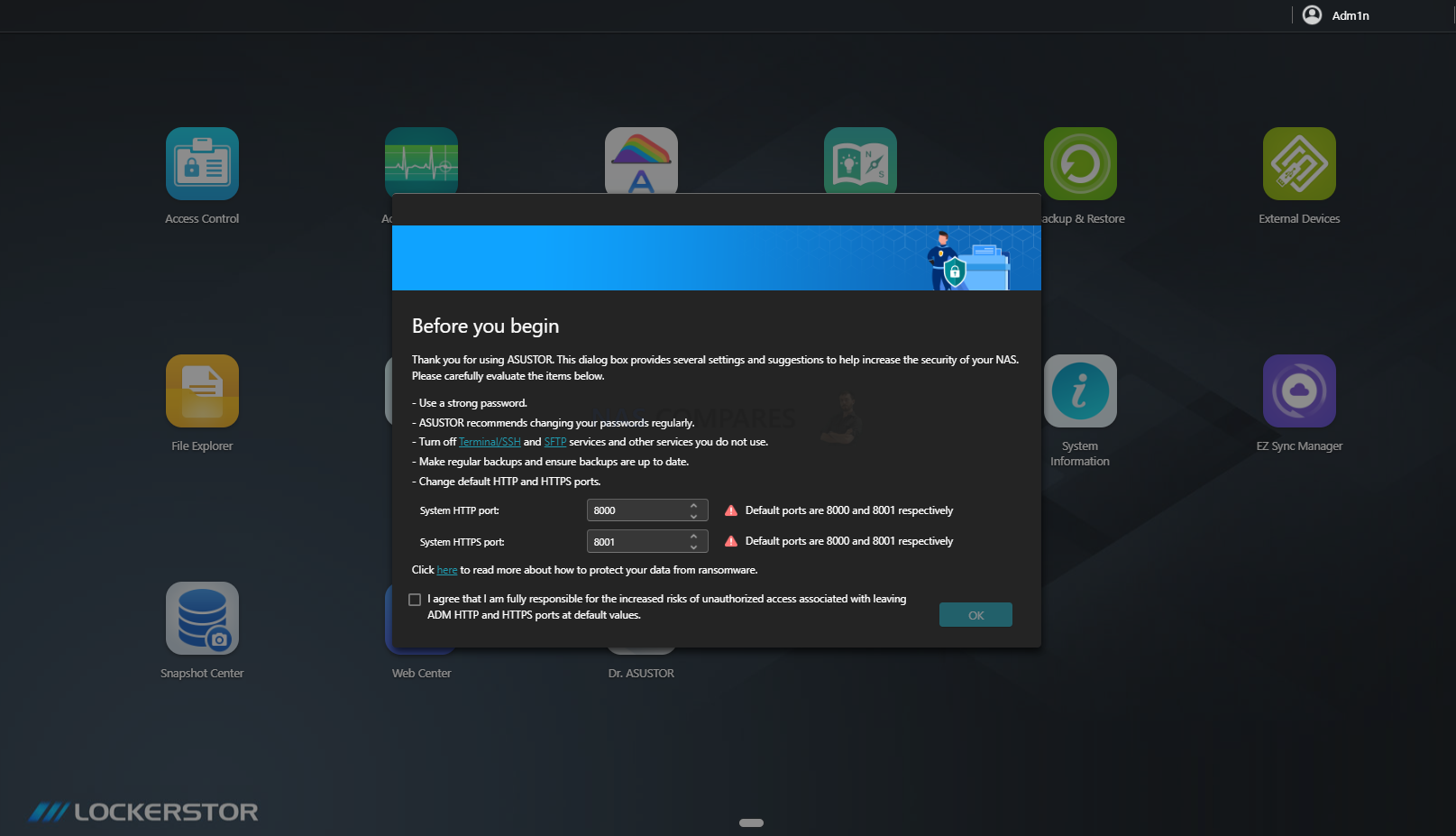
LooksGood Media App – Built-in three main video library categories; movies, TV shows, home movies and smart video sorting management
-
- The efficient global search function allows for searches by keywords followed by the execution of more detailed searches for the purpose of finding categories of movies, TV shows, home movies and parameters such as actors, director, year, genre, writer and title
- Attractive poster wall and thumbnail display
- Automatic production of video poster thumbnails
- Centralized management and ability to configure the order of favourites and playlist history
- The system administrator is able to configure video library and editing permissions according to user preferences
- Can configure access permissions to share with
- Multimedia conversion feature
- Self-defined smart folder for video conversions
- Supports digital TV recordings via digital
- Easy streaming with Chromecast and DLNA
- Supports playback of videos in Apple TV via AiVideos tvOS version
Plex – Hardware Transcoding (with a Plex Pass) is likely and with 1080p handled very well indeed, as well as some Plex 4K transcoding in H.265 (upto 60-80Mb bitrate) and the majority of H.264 Media upto 100Mb bitrate
Virtual Machines – A graphical embedded CPU like the one here will run Windows 10 and Android VMs very well. With the added support for Ubuntu and Hackintosh with VirtualBox. Then there is the option to scale up that memory to allow smoother VMs
Storage Management – BTRFS Support, as well as EXT4 for the traditionalist, Multiple Snapshot storage and browsing for recovery, a large number of ISCSI and LUN target creation, fast-acting SSD caching use. Remember that those M.2 NVMe SSD Bays can be used as both raw Pools and Caching
Network Management – Support of LAG, Load Balancing and virtual switches, as well as maintaining top transmission over 2.5/5/10Gbe for editing or gaming over the network. As well as Jumbo Frame control, DDNS automation, Wake on LAN support and internet/external NAS access with EZ Connect
Backups – Supporting a wide range of multi-tiered backup options that can be carried out simultaneously thanks to the powerful CPU in the Lockerstor and Nimbustor NAS systems, such as network RSync, USB Backups, NAS-2-NAS migration, Cloud Backups with Google Drive, Dropbox and Backblaze and numerous RAID levels internally for redundancy.
Content Management – Numerous Content Management Systems (CMS) and Customer Relationship Managers (CRMs) available in 1st and 3rd party forms, with simultaneous operations supported by this NAS
User Account Control – Supporting over 4,000 accounts, each with its own bespoke privileges and access levels, as well as grouping methods to automate the process easily
Security – AES 256bit hardware encryption on data in/out of the device, as well as over backup methods, with the Intel Celeron CPU in the AS6704T maintaining high R/W speeds throughout, as well as Windows ACL permission and configuration, auto blacklisting and multiple VPN provider support
Antivirus (ClamAV) – Scheduled Scans, Automatic Virus Definition Updates, Quarantine Infected Files
Download Center – Supports BT(Torrent & Magnet Link), HTTP and FTP Downloads, Torrent Search, Bandwidth Control, RSS Subscription and Automatic Downloading (Broadcatching), ASUSTOR Download Assistant for Windows & Mac
DropBox, OneDrive and Google Drive Sync – Each ADM Account is Able to Individually Log into one cloud Account, supporting Sync, Directly Upload Files to cloud from the NAS, or from cloud to NAS
Mail Server – Each ADM Account can Become an Independent Email Account, Provides SMTP, IMAP and POP3 Mail Protocols, Spam Filter and Black List Settings, Antivirus Scanning for Emails, Exclusive Email Backup Mechanism, Auto-Forwarding and Auto-Response Protocols
Photo Gallary – “Album” and “Browse” Viewing Modes, Manage Photo Album Access Rights: Public Access, Restricted to Certain Accounts, Album Password, Multi-level Folder Structure Support, Supports Tagging of Photos, One-click Sharing to Social Media (Facebook, Google+, Twitter, Plurk, email), Intuitive Drag and Drop Management, Slideshow Viewing Mode, Supports a Wide Range of Image Formats: JPG/JPEG, GIF, PNG, BMP, TIFF, RAW and Supports Video Playback
Surveillance Center – Up to 64 channels in 720p on single live view display, On-screen camera controls including camera PTZ, manual recordings, take snapshots, configure camera settings and open Maps, Up to 4 channels of synchronous and non-synchronous playback with audio, Intelligent video analytics including motion detection and foreign object detection, Supported Browsers: Windows Internet Explorer, Microsoft Edge, Firefox, Mac Safari, Mac Firefox ESR, Event notification supports SMS, E-mail, and mobile push notification, AiSecure mobile app for iOS and Android with Push notification, Maximum IP Cam (4 Free Licenses; Additional Licenses to be Purchased)
Takeasy – Download from YouTube, Vimeo, Twitch and More, Selectable Video Type and Quality, Automatic Downloads with YouTube or Twitch Subscriptions, Preview Downloads in Progress and Online Playback
SoundsGood Audio App – Import Personal/Public Music Collection, Personal/Public Music Collection Permission Control, Playlist Editor, ID3 Tag Editor, Local Speaker Support: HDMI, USB, Audio Jack, Supported Audio Formats for Browser: MP3, WAV, Ogg, Supported Audio Formats for Transcoding Through Browser: AIFF, Flac, Supported Audio Formats for Local Speaker: MP3, WAV, Ogg, AIFF, Flac
Backup Tools – Rsync (Remote Sync) Backup, Cloud Backup, FTP Backup, External Backup, One-Touch Backup, EZ Sync, Btrfs Snapshots
These are just the tip of the iceberg and I will be going into more ADM 3.4 and AS6704T applications in the Software Review.
Here is how the Asustor ADM platform compares with the Synology DSM platform:
Asustor AS6704T Lockerstor 4 Gen 2 NAS Review – Conclusion
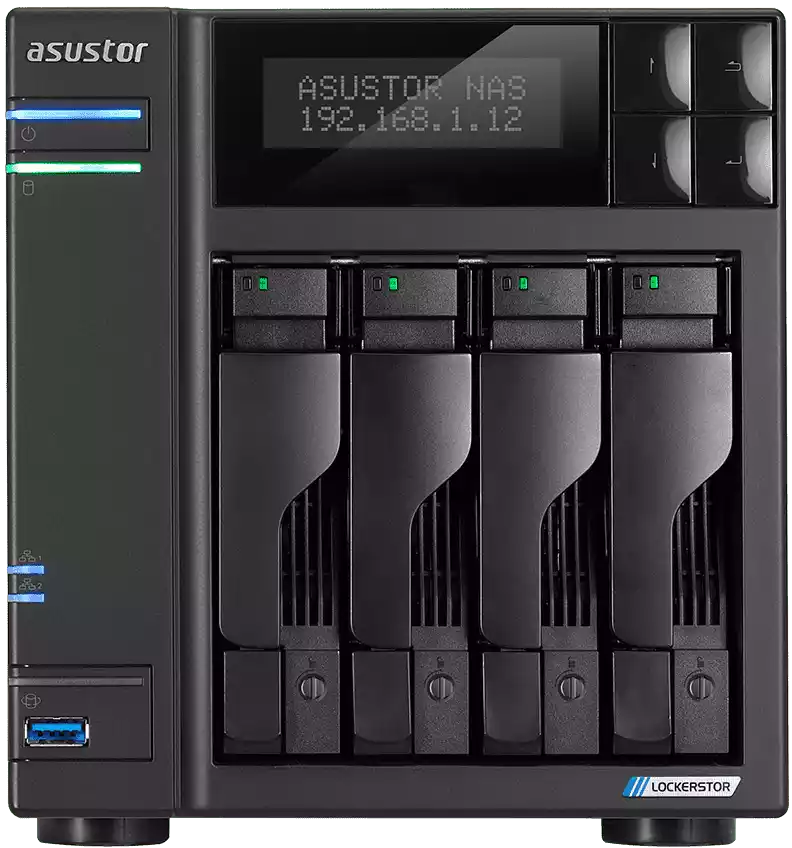
The Lockerstor 4 Gen 2 NAS is a respectable piece of kit! Indeed, the hardware here is almost faultless! Unless you are particularly noise sensitive (and therefore the metal chassis adding a few dBa to the ambient sound), there is almost nothing I can fault here on the device’s hardware. The scaling up of practically all hardware over the Gen 1 Lockerstor, such as Better CPU, Better Memory that goes higher, HDMI 2.0b, USB 3.2 Gen 2, a 10GbE upgrade option and THOSE FOUR M. 2 NVMe SSD SLOTS – you simply cannot fault how much is getting included here at the price point vs it’s competitors. The software is a little less compelling, with a smaller range of 1st party applications on offer, more of a reliance on 3rd party services and the absence of a few AAA+ features that are present on other devices in the market (AI services, Cloud Bolt on live synchronization, 1st Party SaaS native sync with Google Workspace/Office365, etc). That said, ADM does run very well, is clear and still quite user-friendly. The addition of choice of file systems EXT4 or BTRFS, flexibility on the use of those M.2 NVMe SSD bays and the Asustor HDMI portal still bring fantastic flexibility to the Lockerstor 4 Gen 2 NAS too. Ultimately, this is a system that is clearly making big waves on it’s hardware more than its software, but as long as you keep your feet on the ground and appreciate that this system is more of a 70/30 purchase of hardware vs software, you will come to respect and rely on this Asustor NAS as the backbone of your data storage setup.
| PROs of the Asustor AS6704T Lockerstor 4 Gen 2 NAS | CONs of the Asustor AS6704T Lockerstor 4 Gen 2 NAS |
| Hard/Impossible to find this level of NAS Hardware elsewhere at this price point
Those FOUR M.2 NVMe 2280 SSD slots are great and turn this 4-Bay NAS into an 8-Bay 2.5GbE by default, as well as the option to add further 2.5/5Gb connections over USB The option to scale up the network connectivity to 10GbE down the line (4 and 6 Bay only) $60 increase over RRP of Lockstor Gen 1, but upgrades practically everything 1-2 levels (New Celeron CPU, Better/High Memory Max, USB 10G, HDMI 2.0b, PCIe Gen 3 Architecture) Includes support for either EXT4 or BTRFS Includes KVM Support with Parallel GUI over HDMI, Asustor Portal ADM is better tha nit has ever been, responsive, clear and intuitive Several different setup and initialization options One of very few 4-Bay NAS drives that still feature a fully functional and controllable LCD Panel Full Support of the traditional RAID levels for this scale (RAID 0-1-5-6) Storage can be expanded with TWO of the Asustor AS6004U 4-Bay |
Lack of a fluid RAID System (such as Synology Hybrid RAID, Drobo BeyondRAID or Terramaster TRAID) to allow mixed drive media and easier scaling of storage over time
Metal chassis and trays is going to result in an increase of ambient noise (hum/vibration) than other plastic casing/tray NAS systems Some apps (such as the Surveillance Center apps) are long overdue an update in visuals and services ADM is good, but lacks the killer apps/AAA and AI service tools that are being offered by other brands right now They were targeted by the Deadbolt ransomware attack at the start of 2022 and although the linux vulnerability that was used has been reported to be closed and they worked with affected users, this is still going to be on the minds of some buyers |
Need More Help Choosing the right NAS?
Choosing the right data storage solution for your needs can be very intimidating and it’s never too late to ask for help. With options ranging from NAS to DAS, Thunderbolt to SAS and connecting everything up so you can access all your lovely data at the touch of a button can be a lot simpler than you think. If you want some tips, guidance or help with everything from compatibility to suitability of a solution for you, why not drop me a message below and I will get back to you as soon as possible with what you should go for, its suitability and the best place to get it. This service is designed without profit in mind and in order to help you with your data storage needs, so I will try to answer your questions as soon as possible.
📧 SUBSCRIBE TO OUR NEWSLETTER 🔔
🔒 Join Inner Circle
Get an alert every time something gets added to this specific article!
This description contains links to Amazon. These links will take you to some of the products mentioned in today's content. As an Amazon Associate, I earn from qualifying purchases. Visit the NASCompares Deal Finder to find the best place to buy this device in your region, based on Service, Support and Reputation - Just Search for your NAS Drive in the Box Below
Need Advice on Data Storage from an Expert?
Finally, for free advice about your setup, just leave a message in the comments below here at NASCompares.com and we will get back to you. Need Help?
Where possible (and where appropriate) please provide as much information about your requirements, as then I can arrange the best answer and solution to your needs. Do not worry about your e-mail address being required, it will NOT be used in a mailing list and will NOT be used in any way other than to respond to your enquiry.
Need Help?
Where possible (and where appropriate) please provide as much information about your requirements, as then I can arrange the best answer and solution to your needs. Do not worry about your e-mail address being required, it will NOT be used in a mailing list and will NOT be used in any way other than to respond to your enquiry.

|
 |
UGREEN DH4300 & DH2300 NAS Revealed - Good Value?
Aoostar WTR Max NAS - Should You Buy?
Xyber Hydra N150 NAS Review - Is This COOL?
Minisforum N5 Pro vs Aoostar WTR Max - The BIG Showdown
Do MORE with Your M.2 Slots - GREAT M.2 Adapters!
5 Top Tips for Content Creators Buying a NAS
Access content via Patreon or KO-FI


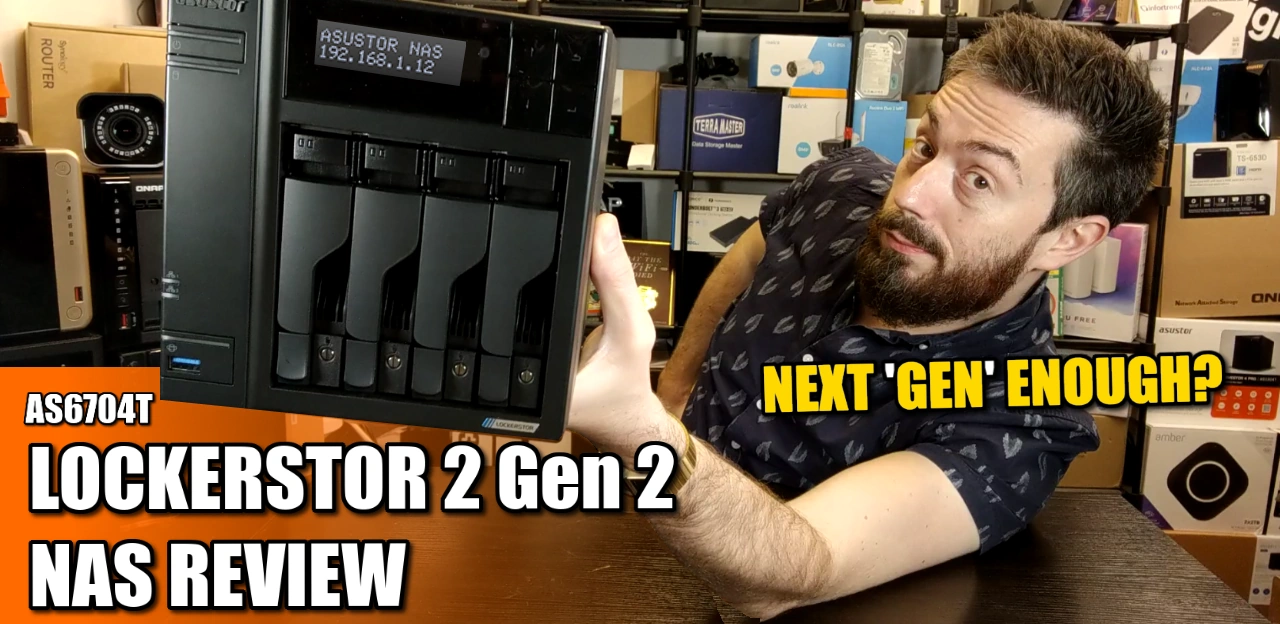




This video and your long-form review of the 4 bay have really helped me consider next steps for my setup. I run Emby off an old iMac but I need to upgrade the external storage so that it’s fault tolerant (so double the drives or go RAID) which means buying a multi-drive enclosure and more hard drives, and while this option would roughly doubly the cost of that project, it takes the iMac out of contention entirely by taking over server duties, and so in the end, a new computer + RAID enclosure is more expensive and less future proof than getting a NAS like this and running the server from there. Plus it gives me access to other services I can host that I might find useful. Thanks for the excellent content!
REPLY ON YOUTUBE
Great explanation !
One question though.
I have 4 NVMe SSDs
I want to use 2 for the ADM (OS) and the other two for SSD caching.
Is that possible and if so is that advised and what are the steps to setup this configuration exactly ?
Can you shed some light on this?
Kind regards.
REPLY ON YOUTUBE
synomogy had become apple. Stay away.. Money sinking machines…
REPLY ON YOUTUBE
please update this video..
REPLY ON YOUTUBE
This or the Terramaster 4bay Pro?
REPLY ON YOUTUBE
I need ecc for zfs. Done.
Plus, I want the power. I can stick a little cheap GPU in of needed and it’d be way more powerful.
REPLY ON YOUTUBE
Love the channel, but for GOD sake man, slow down and breath now and then
REPLY ON YOUTUBE
Safe to say that this blows Synology DS720+ out of the water as a Plex server?
REPLY ON YOUTUBE
Could you please put a review on Asustor Xpanstor 4 – 4 Bays expansion box? And also advise on whether it makes sense to add a Synology NAS to an Asustor 2bay NAS?
REPLY ON YOUTUBE
Soo able to turn the nas to a media player with nas support thx to the hdmi? 2 in 1
REPLY ON YOUTUBE
Great review, quick question when you have a moment, can you let me know if you can use Seagate desktop barracuda drives in there, unfortunately, they are 8TB SMR, not CMR. I have 6 laying around that I want to use, was originally going to build a x470 file server with a 3900x cpu that I haven’t got around to doing. Thanks!
REPLY ON YOUTUBE
I know this video isn’t new but I have one important question:
I’am looking for a cheap NAS. My requirements are, affordable price, mainly used for storage, storage needs are 10 TB and should have the capability to handle my DVD and BluRay collection which I complety transcoded and stored in HEVC (H.265).
What I did not understand is, why Plex do need to convert H.265 media for a playback? Right now I’m using Kodi with an external 5 TB HDD. Kodi has no issue to playback H.265 media so does not VLC. As Plex is a solution I have to pay for I would expect native playback of H.265 as well.
Thank you for any answer and thank you for this really good and deep review of Asustor NAS!!! It already helped me by a lot!
REPLY ON YOUTUBE
I started off with an WD PR2100 then upgraded to qnap ts-464 but with the Qnap I have been having cpu issues the cpu is constantly working at over 90% an when I watch certain movies it buffers alot thinking about getting an asustor all I am running on the Qnap ts-464 is plex no 4k movies
REPLY ON YOUTUBE
I was looking at the 4 bay, and with shipping it was ~$830, but the 6 bay was $840, plus $90 shipping …(damn that shipping to Japan!) Needless to say, the 6 bay I ordered (your fault!) should hold me over for my remaining lifetime! (I will need a 5 port 10 GbE switch soon….!)
REPLY ON YOUTUBE
Prior to setting up my SSD cache is was getting READ speed of 536MB/s and WRITE speed of 569MB/s. I setup my (2) 1tb m.2 drives as SSD cache and now im getting 295MB/s / 587MB/s . What would cause the read speed to drop after setting up SSD cache? I have the Asustor 5404t with 16gb of ram. I have the Asustor AS5404T
REPLY ON YOUTUBE
Got mine free. Good value for money, austor.
REPLY ON YOUTUBE
Hello, are you still using AS6702T? Can you help me test whether the NAS’s power will automatically turn on after being turned off? I encountered this situation and opened a case with Asustor support but it still hasn’t been resolved. Judging from the records, when the NAS is shut down, it will automatically start up once within 14 days. My setup is four 2T m.2 SSDs and two IronWolf Pro 14TB. Thanks.
REPLY ON YOUTUBE
Too much stuff bro, too many words… make these comparisons simpler in the future so they r easier to handle. Thx 4 the vid!
REPLY ON YOUTUBE
The fact that you have to make a choice between NVMe and 10Gb/s is a bad point to my eyes, because I need both…
A unique USB port at the back makes me anxious about the use of a UPS: is the Asustor able to “understand” the communication with a UPS, and is it possible to use a HUB to connect more than 1 usb device ??
The possibility to use NVMe as a Storage Pool is great, it was not possible on the Synology Nases until recently, but Synology has changed its rules and it is possible now.
Nevertheless the Synology restrictions regarding the RAM, NVMe and disks, trying to enforce the use of their own brand (too expensive) is more and more unacceptable, and may push me to buy anther brand such Asustor or Qnap for my next NAS (my 12 years old DS413 has to be replaced)…
REPLY ON YOUTUBE
Please make compare Firewall GUI for Asustor, Synology and Qnap.
REPLY ON YOUTUBE
Next time, please do deep review for Adm Firewall. I guess many people like this!
REPLY ON YOUTUBE
I just got a Lockerstor 2bay Gen 2 AS6702T. I’m upgrading from an AS1102T, I have 2- 1TB NVMe to put in it, should I just install my 2- 8 TB drives first and get it running right before I add the 2- 1TB NVMe drives? That seems to be a proper way to do it, I’m going to be using the NVMe drives for read/write cache not storage.
REPLY ON YOUTUBE
The biggest problem I have is with subtitles. I have a Nimbus 5304T and I watch a lot of foreign films (French, Japanese, etc..). Even with .srt subtitles – supposedly the smallest – the Asustor struggles with Plex (I’m using the freebie). Asustor have told me that Plex lacks the power to run these things effectively and even given the spec of the Nimbus, I’m inclined to agree. Yep; it’s not a Lockerstor but it still has 4GB of RAM and a quad core Celeron, which puts it in the same category as the equivalent Synology.
Furthermore, Plex has been the cause of a lot of my troubles and I’m currently trying to find out why I can no longer see the NAS through it and why launching with the IP address results in the webpage failing to load.
REPLY ON YOUTUBE
I owe you an apology. When I first found this channel, I thought it was quite heavily focused on Synology but I didn’t realise just how much you were actually doing and the support you provide to people like me who have Asustor. I’m sorry for my remarks.
And thanks.
REPLY ON YOUTUBE
In the office and in our home, so far we have no trouble using asustor even in my clients used it. I am confident of asustor than other brands.
REPLY ON YOUTUBE
I just bought a Asustor gen 2 NAS…. what a piece of garbage!!! will bring it back later this week.
My cheap asus router can play 4k better via SMB then this device with plex.
REPLY ON YOUTUBE
You did not set up your NAS correctly for this test. You need to enable Media Mode via Settings -> General -> Media Mode, which disables S3 sleep. This will then allow transcoding via GPU.
You also must use Plex Pass to use hardware encoding. After doing both of these you should barely see any CPU usage as the GPU will be doing the work.
ASUSTOR has a video about this on their YouTube.
REPLY ON YOUTUBE
Great video as always from you, informative and great! I’m really new to all this NAS world and been watching your videos and getting a lot of great info and knowledge. Thanks for doing these!
One suggestion though, your audio might need a bit of improvement. Just a suggestion and my personal (subjective) view, so please don’t be offended. I don’t know what kind of mic or system you are currently using to capture your voice but there could be some room for improvement.
– In post, you could get rid some of that room echo. There are many de-verberate tools available, like Acon Digital DeVerberate, iZotope RX De-Reverb etc.
– try speaking a bit slower as it gets a bit “essy” (messy s-letters, because of your teeth?) at times. Especially for your non-native English speaker audience it can be hard to fully understand the message. Speaking a little slower can help, there’s no need to rush.
– try using a lavalier microphone or a “shotgun” microphone to improve the sound quality in general and further help with the room (ambient / reverb) tone.
– In post, you could edit the sound a bit more polished; eq, de-ess, compress, limiting.
Thanks again, keep up the good work! Loving your channel! 🙂
REPLY ON YOUTUBE
Not good to understand. To much information. To much talking. No summary. Spam of information which is not good to understand.
Thanks for the try.
REPLY ON YOUTUBE
No summary ! No like !
REPLY ON YOUTUBE
Can you use M.2 SSD & the 10G card together?
In early days, they firmware is playing up a little, but you should be able to do this.
AS-T10G3 Card works with these NAS:
For AS7112RDX / AS7116RDX / AS6504RD / AS6504RS / AS6512RD /AS6704T / AS6706T
I’m confused why my raspberry pi is able to deliver original 4k HEVC 80mbps+ via web better than this can…. something is wrong here.
REPLY ON YOUTUBE
got one recently to replace a synology DS220+ (got the AS6702T), quite a bit more expensive but wile more difficult in some aspects Super happy with it.
it lives in the living room and the DS220 was just ALWAYS reading and writing something to the drives and was quite loud (poor HDD mounting solution IMO).
the AS6702 being able to install the OS on a SSD mostly spends it’s time there which is the first perk, the HDD’s are mounted way better reducing ratteling noises under read/write…little less sound dampening but a much cleaner less annoying sound all together.
and wile NAS disks arent really supposed to do it, it can hibernate the HDD’s when the tv’s are off and we’re away as all they do is store media not everything >.>
can also be used to re-encode files though….only lighter workloads (264/265 w/o denoise) I mean it’ll get the job done but as mine is also my pihole that does not like being choked out by a video re-encode and if you limit the core’s it’ll take literal days to get anything done so I’m opting to let the desktops handle those loads (2d on nas or 45 min on a 12 core desktop think due to sheer speed the desktop also eeks out a w in power efficiency 😛 ).
REPLY ON YOUTUBE
I don’t understand why you would not want to optimise your CPU performance with SMT. It’s basically just saying you’re happy to have your CPU sitting idle instead of working, for a slight improvement on task completion times.
REPLY ON YOUTUBE
Do do you think the M.2 NAS boxes are better than the SSD NAS boxes? Would you recommend having 2 separate NAS boxes for replication/redundancy?
REPLY ON YOUTUBE
I don’t really care about 4k on the NAS, but all my videos are HEVC 1080p, it should be alright on this one right?
REPLY ON YOUTUBE
I wonder if I can use this model as DAS, instead of NAS…
My question is because I use Backblaze as a cloud backup (and it doesnt support NAS)…
REPLY ON YOUTUBE
Hi, Really helpful profile, thanks for posting. One question, whilst the main drives are set to say RAID 5 can you set the SSD’s to RAID 0 (or other even)? I only have one WD RED SN700 and wanted to just use this single SSD it to keep the ADM and Apps on.
REPLY ON YOUTUBE
????
REPLY ON YOUTUBE
all this stuff is great, but, do you have a video that explains the HDMI hook up specifically, and shows the specifics on going from the Asustors HDMI connection to a HDMI connection on the back of a tv? Can i play my servers 4k videos in full resolution? and what software should i install to achieve this, Thanks for considering answering me, i love my asustor nimbustor server with PLEX, my family accesses all the old family videos across the internet, they love that there is no old camera to set up, Pipefittermike on You tube
REPLY ON YOUTUBE
Do we need license to display app ?
REPLY ON YOUTUBE
Good morning i like yours vídeos so much, i am new in this world nas, and im thinking buy one, Could you tell me wich is better NIMBUSTOR 2
AS5202T or Synology 220+ Interface.. mobile apps etc. thanks a lot !
REPLY ON YOUTUBE
Why can’t Synology get with the embedded graphics program! If QNAP interface and software was more user friendly. Synology would really have problems.
REPLY ON YOUTUBE
Please do a vid on putting an open source OS on an ARM based Asustor! No one has done it!
REPLY ON YOUTUBE
Hello. could you see the m2 SSDs by default after installing it into your lockerstor? I put 2 new Intenso 128 GB m2 SSDs into it, and i cant see them in the storage manager or create a SSD Caching. Not sure, if i have to initialize them before like in windows os?
REPLY ON YOUTUBE
Hey guys – really good video. I really researched this topic a lot and decided against the 923+ or 723+ due to dual core and no embedded graphics. I will tell you though, the the 1500B Ryzen in the RS1221+ is a beast. It is by far the fastest NAS I have. My RS422+ has the Ryzen 1600 in it and I’m not super impressed. Most home users are not going to benefit from 10GBE yet because everything else in the house runs 1GBE or less. I’m sticking with the DS920+, DS720+, and RS1221+ for now and skipping the 23+ series. I think Synology really let us down on this one. Also, the hard drive selection on these from the QVL is getting stupid for something that crosses between home and business NAS for the home user who wants more power.
REPLY ON YOUTUBE
I have this 2 bay Nas, admittedly I have 16mb of ram, 500gb of nvme read/write cache and 250gb nvme boot drive. I also have both network ports plugged into a 2.5gbe switch with adaptive load balancing being utilised. The main hdd’s are 2 ironwolf 8tb drives and is where the media is streamed from. I have no issues what so ever playing any type of media file even a h265 file with a bit rate of around 60mb sec. I use jellyfin to stream my media.
REPLY ON YOUTUBE
Do you cover what your transcoder quality setting is at? Seemed like it was capping at 50%. Guessing it’s not set to Make My CPU Hurt
REPLY ON YOUTUBE
Seems like it had issues with almost all the tests. Sucks that all the NASes use the same crappy Celeron chip (or worse), unless you pay like 3x more. For what these cost I’d want something more futureproof for different 4k formats. What do we do, wait for the next gen of overpriced compromises? Right now there are really no compelling options..
REPLY ON YOUTUBE
Great Video but what do you think about the Kickstarter NAS Storaxa for 222€ (Linux OS | Max 142TB Storage | 5xHDD | 4xSSD | TrueNAS | WiFi 6 | 4x 2.5GbE | Intel CPU | SD+MicroSD Card Reader | 4x 10Gbps USB Ports)
REPLY ON YOUTUBE
Interesting the 453E with slightly less hardware, absolutely spanks those HEVC files and the better hardware of the Asustor doesn’t…
REPLY ON YOUTUBE
If you’re going to buy a 2-6 bay NAS like this and you know how to use Docker Compose and swag and properly configure a network (thus meaning you don’t really need to care what the UI is like and what applications are available in the package center as you’re going to use something better anyway), I think Asustor is the way to go, as I feel like Synology gets in my way too much on this front and their hardware is garbage now. QNAP has other problems, like refusing to support btrfs (and most of the cheaper models aren’t going to support ZFS, which is better than btrfs but isn’t normally used for such small arrays).
REPLY ON YOUTUBE
I am trying to choose between Synology 2 bay NAS DiskStation DS220+ and Asustor Drivestor 2 Pro AS3302T. I want to mainly use NAS to backup photos & videos, and also stream them later. Anyone got any suggestions?
REPLY ON YOUTUBE
I just purchased a 723+ and a pair of 12TB drives. Did I make a mistake? What would you purchase instead, staying in the Synology family, DSM is the requirement. I am not going to use Plex ever, It will be mostly used for personal cloud and Synology Photos for local management of my family’s photos’ and videos.
REPLY ON YOUTUBE
Hello, Very disappointing product, rubbish software (does NOT work) Lousy customer service. BAsed on my own personal experience, give this product a miss.
REPLY ON YOUTUBE
Are you an auctioneer? Speak slower if you want Americans to pay any attention to you at all.
REPLY ON YOUTUBE
Just upgraded from a DS1812+ recently and ended up with DS920+ instead of the 923+ purely because Synology opted to use an iGP-less chip for the new generation. There are ryzen embedded chips with igp. So disappointed with Synology for cutting out the igp in their new prosumer models.
REPLY ON YOUTUBE
one last thing … how is the power-efficiency on theses?
REPLY ON YOUTUBE
brilliant review! thank you a lot! really!
REPLY ON YOUTUBE
Ran into a problem. Could not get an asustor ID. Error was unable to connect to asustor server. Couldn’t get support without asustor ID. So, stuck. Very frustrating. Hopefully I can work it out.
REPLY ON YOUTUBE
how good is this for plex
REPLY ON YOUTUBE
Let me start off by revealing I do not know much at all about Networking or wifi.
I am installing a completely new home system.
HOW CLOSE can the Nighthawk AX6000 WiFi Router (RAX120) be located to the NAS unit, and the unmanaged Switch?
I was hoping to place them on a wooden DIY shelf I’m making, to go on top of my file cabinet in my office.
The arrangement will be as follows:
• Router (will set OUTSIDE, top of shelf unit)
• Unmanaged Switch (will set inside the shelf unit; on top shelf)
• NAS Unit (will set inside of shelf unit; on bottom shelf)
If this setup is a problem, could I circumvent the problem by building the shelf unit from metal, and grounding the metal to the center safety grounding screw of a 110vac wall outlet?
REPLY ON YOUTUBE
Raid is garbage, for personal use. Just follow the 3 copies law and you’ll be OK. Anything important, which for the home is generally documents, photos and home videos just use MEGA or Google Drive. Have a USB drive for the second or just use two of them, skipping the online storage and use this as the third and local. Most drives spend 6 months to a year letting you know they are having issues before they finally die. Plenty of time to just copy files over, but the majority of things are perfectly fine in raw storage configs with the file system of your choosing. You are basically buying an Acer Aspire cheap computer here with the benefit of extra storage and swap bays. Asustor has always been a company doing it right and their own way. What other NAS in this price range can you play some CS-GO on, or play beast games off your main PC with Parsec? It’s an over-engineered value monster and you need to own one right now!
REPLY ON YOUTUBE
How do you see that the scarers put the CPU at 70 degrees in idle? At least on 4-bay models like this one. That throws me off a bit. In summer I don’t even want to imagine
REPLY ON YOUTUBE
The Synology DS923+ NAS Review is now LIVE! Find it here – https://nascompares.com/2022/11/16/synology-ds923-nas-review/
REPLY ON YOUTUBE
On 2280 can I mount 2.5form factor SSD? Say Samsung 870 evo 2TB internal ssd
REPLY ON YOUTUBE
I got a Asustor AS3202T that got hit by the Deadbolt ransomware. I was running Plex, EZ connect and other port opening services as well as the default admin account. I had no experience in NAS security back then but ever since the attack I’ve been reading up a lot. Now I want a new NAS and after the attack I thought “never more Asustor” and started looking at the Synology DS1621+, but considering all the features in Lockerstor 6bay gen 2 I’m really contemplating getting Asustor again. I will use my old NAS as backup and set up snapshots, not use external access without vpn, set up different accounts etc and make as much security adjustments as I can but I still totaly can’t fight the feeling of insecurity ???? what are your thoughts? Am I overthinking the security threat? Should I go with Asustor or combine new Synology with old Asustor as backup. Is there any security benefit of combining brands? Thanks for a great video!
REPLY ON YOUTUBE
Can the Lockerstor 4 Gen 2 take various speed drives? I understand the drive capacities need to match, but, I have 2x 4TB Iron Wolf’s which run at 5900 RPM. Buying another 2 will likely mean I have to purchase 5400 RPM as the former is now discontinued. Will speed differential cause me issues?
REPLY ON YOUTUBE
Cool
REPLY ON YOUTUBE
I’m sorry but this videos is just misinformed. The integrated graphics are not used for transcoding. There are dedicated chips for this purpose. The memory is a huge boon and the base model wattage is 15 not 25. They could have stuck with Celeron but the amd isn’t bad and was specifically created for embedded unlike the celeron.
I think it’s a smart move
REPLY ON YOUTUBE
Love mine and got unRaid working on it just fine. F2 is how you get into bios if anyone is interested. Works like a champ so far. Going to stress test it and do some 4K Plex transcoding hopefully soon. So far happy with the purchase and nice to know unRaid can run on it as that is my preferred NAS OS.
REPLY ON YOUTUBE
I have the older Nimbustor (5304) 4 bay. Would there be a way to migrate my 4 disks to the 6 disk Lockerstor and add two more disks without losing my data ?
REPLY ON YOUTUBE
I’m about to buy my new NAS and I was wondering if the software supports snapshots. Thanks
REPLY ON YOUTUBE
Was thinking of going synology but with them pushing having to use their drives on their platform, is sort of a deal breaker i feel, Lockerstor is the only other choice in my country so tempting but maybe I should just setup my own
REPLY ON YOUTUBE
AS6604T owner. ADM BTRFS RAID5 avoid! Stuck in booting-storage loop, 21TB data on there. 🙁
REPLY ON YOUTUBE
I have the 4 bay version of the gen 2 here. I am interested in a combo card for the 10GBE and nvme. Where can I find those?
REPLY ON YOUTUBE
9:34. Hi there! We do not have official support for 5GbE on USB and do not recommend people go out and purchase one. We do, however have upgrades in the works to help people add 10GbE AND M.2 to their NAS. Stay tuned!
REPLY ON YOUTUBE
I love my ASUSTOR AS7004T currently looking to upgrade to a gen 2
REPLY ON YOUTUBE
Changed from. 1817+ to 1821+ resulted into 3.5gbit to nearly 7gbit performance of a single 10gbe copy from my pc
Same Intel card, same hdds… Just the Nas changed.. Thanks ryzen…
REPLY ON YOUTUBE
*Intel Celeron J4125* : _Release Date Q4 2019,_ 4-Core CPU with Integrated Graphics (Synology 2020 NASes)
*AMD R1600* : _Release Date Q2 2019,_ 2-Core CPU with no Integrated Graphics (Synology 2023 NASes) Progress ? ????????????
REPLY ON YOUTUBE
i’ve watched your other vidoes of 4k comparasions but these NAS are not able to play HIGH BITRATE 4k content. So if the intel CPU is powefull enough then what is creating the bottleneck? because streaming is mostly IO bound process (as contracy to cpu bound process which requite more processing power) so processorer can’t be bottleneck. what are everyone thought on this?
REPLY ON YOUTUBE
IGP missing is not good
REPLY ON YOUTUBE
Im going Qnap next time. Syno is just doing everything wrong lately
REPLY ON YOUTUBE
Hello guys. I’m really confused ???? I want to buy a NAS but what should I buy? Synology? Qnap? What processor? I want to use it as a media player. Most of my video’s are 4K or 4K HDR/Dolby vision. Please some advice? Thank you.
REPLY ON YOUTUBE
Hmmmm …. AMD is famous for it iGPUs.
???????????Welllllllllllllllllllllllllllllllll why in the heck didn’t Synology just put a AMD CPU with iGPU in their darn home/office NAS???????????? (no entiendo senor 😉
REPLY ON YOUTUBE
I ended up buying the 1522+ as I was hopeful it would have a graphics processor but come to find out that it’s not really needed and not a hill to die on to be honest. Better option is the 10GBE (that should have been included) as a future proof option and more ram. If embedded graphics is a must for plex then just buy a NUC or use a old computer for a Plex server. Most if not all formats play on newer devices so transcoding isn’t needed.
REPLY ON YOUTUBE
I think even the seagull behind Ed was totally unimpressed by the argument for AMD. Of course if Synology’s aim is to have a separate range of commercial NAS and a separate range of consumer, media, NAS then fine.
But they should announce their intentions as I guess half their customer base wants Plex and also 1gb Ethernet and has no use for 2.5 gb or non embedded graphics
REPLY ON YOUTUBE
Trying to “both sides” this is a bad look for your credibility as an independent reviewer. Call it like it is – this is a bad move from almost any angle, and the few advancements in the -23 series are things that could have easily been achieved with a newer CPU with integrated graphics. Synology cheaped out because they got a good bulk deal on low end Ryzen chips, and their product lineup is going to suffer for home users for the next few years because of it.
It feels like you’re so committed to Synology because your YT channel relies on them being successful, so you don’t know how to react to bad decisions like this other than to put on a brave face.
REPLY ON YOUTUBE
14:53 really says it all….
We have no issue with AMD powered CPUs if they would have the same or better GPU power which the R1600 has not… APU NAS when?
REPLY ON YOUTUBE
What is the NAS going to be used for? I think with the support of virtual machines and containers, your NAS can also double as your main home server. If that’s what you’re looking for, I’d say go QNAP.
That’s what I did. I bought the QNAP TVS-H1288x. Yes, it is expensive, but it also serves many purposes in my home. I have a Plex server, along with a Windows 11 and Ubuntu VM running, and a few containers to handle various duties in my house. It has 4 2.5Gbe ports, 2 10 Gbe ports, and 2 Thunderbolt 3 ports for any imaginable network needs you might have. I can still add a GPU if I want and I’m currently only using a portion of the machine’s potential. So I won’t be needing to upgrade this H/W anytime soon.
If you just want a NAS, then the CPUs offered by Synology are more than capable of handling the task. I prefer the Synology S/W over QNAP, but Synology needs to up their H/W game to include at least one 10Gbe port on every model they sell. Buying a NAS today with 1Gbe ports is a waste of money, and quite honestly link aggregation does not do the job. I have an old DS1512+ that is over a decade old and still running fine. None of these new 2023 Synology boxes you’ve been discussing offer much more than that old DS1512+ I already have as far as a NAS is concerned.
REPLY ON YOUTUBE
Would it be a possibility that Synology developed a “graphics card” to plug into the pci-e expansion slot? So you could choose between graphics acceleration or 10G adapter.
REPLY ON YOUTUBE
I just have a separate pc that comes on, on demand for when I need to play Plex media. It boots in 10s so it’s fine. I’ve given up on wanting to use a NAS for videos.
REPLY ON YOUTUBE
Had moved to 1621+ last year, i never found losing the gpu cost me anything. My prefered way to watch video is through ds file and native player, both in home and on the go. I don’t had much those extreme high bit rate video file outside of a select few of collections. Those are wast of storage and money in my opinion.
REPLY ON YOUTUBE
This whole apparent myth about threads = cores is BS. Even at slightly higher clock speeds, the R will underperform vs. the Celeron in a server environment especially, when running multiple processes 24/7 is key. If they had opted for a 4c/8t ofc no contest, but they didn’t. Incidentally that also makes the whole point about more RAM totally moot. Not to mention the lack of iGPU, which makes this plus generation utterly irrelevant to many of the usual customers in this segment. Oh, and that’s not even mentioning the outdated 1G NIC which is laughable at this point.
Btw, Pentium branding is also gone as well as Celeron in case anyone wonders.
I like the back and forth that you guys do though. It’s a great service to your viewers, and ultimately help them choose the right product, ofc on that note your advice should be to avoid this plus generation all together because it’s nothing but a cash grab on Synology’s part 😉
REPLY ON YOUTUBE
I hope they will start using N300 cpus with alder lake E cores, until that i wait for next NAS
REPLY ON YOUTUBE
I wanted to buy a new NAS for Plex/Jellyfin but these new ones are just useless to me…
REPLY ON YOUTUBE
I’m very disappointed about there being no integrated graphics because I think most home users are going to want to play movies on it. Luckily I didn’t hold out on the 923. I gave us waiting and bought the 920 and I’m glad i did. Seems like Synology is definitely heading down the business market on the small units instead of home user.
REPLY ON YOUTUBE
Nothing news on ds1823+? Will use standard hard disk or synology ones?
REPLY ON YOUTUBE
AMD makes power efficient APUs with integrated graphics – the Ryzen U series processors. The Ryzen 3 5400U has 4 cores, 8 threads, 3 GHz base clock, 4 GHz boost clock, and integrated graphics, all with 15W of power consumption. It seems like that APU would be a perfect fit for a NAS that is going to be used to decode and stream 4k video. It may increase the cost a bit, but consumers who want to stream 4k video from their NAS probably would be willing to pay it.
REPLY ON YOUTUBE
I’ve been using Synology NAS for 11 years on a 1Gb/sec wired network and am a Plex user. I’ve experimented with various setups to maximize 4K video delivery to various output sizes, as in iPad/iPhone, PC/Mac, 4K smart TV and 1080p projector. Any time a 4K video had to be transcoded to another size, the Synology CPU was buried. By one user. I found out that the Apple TV 4K also performs transcoding of 4K input to match the display it’s connected to. So the server no longer needs to perform the transcoding (unless I’m on my iPhone/iPad, which requires transcoding, and it isn’t pretty)! This means that the Synology NAS needs less processor cores/speed (in most cases) when transmitting video media.
I, too, am awaiting a new Synology box that provides 4 or 5 discs with at least one 2.5Gbs network connection and a processor/GPU configuration that supports fast video decoding. Without that option, I have no need to upgrade. Synology’s focus is not on multimedia so I look to the near future with doubt. Perhaps Intel will eventually create new devices with this market in mind.
REPLY ON YOUTUBE
I wanted to upgrade my 713+ / DX513 to an 1821+.. ( 1823 ? 1824?..)
If it came out with an R1600 I wouldn’t take it.
I’m ready to put 100 euros more and have power
they piss off synology not to offer a powerful NAS with graphics
REPLY ON YOUTUBE
Not that TDP means much at all, but the R1600 is 12-25w. The old J4125 was 10w. Current Celerons are 40-60w. The R1600 has a graphics version and all R1600 support 2 10Gbe. They could have at least given people that. The R1600 from a computing standpoint beats most celerons and people do want to run docker and maybe VMs, so gimping it with a weak CPU would have been a bad decision.
REPLY ON YOUTUBE
So, I have a DS1821+ with an AMD CPU and all my media on it; Photos, video, and music. I run Plex on an old Dell Latitude laptop with a 2nd Gen i7. I stream my media to 2022 Apple TV’s. Not a single day buffering, local or remote. Works for me, or I’d say so.
REPLY ON YOUTUBE
It depends on the use of the NAS – for me, the primary function of my current DS920+ is to run a Plex Server for remote devices not direct connected devices – in this case, having an IGPU is very important for me so I was naturally disappointed with the DS923+ using an AMD Ryzen which means I now have to look at QNAP or Asustor Lockstor 4 Gen2 with the N5105 CPU when it comes to upgrading – that or switch to using a Windows PC to run Plex which is not desirable due to power consumption
REPLY ON YOUTUBE
Synology is going in the wrong direction. They dropped the ball across the field with not only the cpu shift, but not investing in their hardware. Their software is getting stale as well. They clearly are about bottom line profit and not about product… I’m done with them. QNAP is putting money and thought into what they are doing, I’m with them.
REPLY ON YOUTUBE
synology needs to sell its operating system or with subscription like qnap.
REPLY ON YOUTUBE
I am 100% with Eddie here. This is a pure business release of products cause they “had” to put out their xx2/3 models. Its obvious for anyone that knows this product category that these amd cpu`s is not suited for these nas`es. They are only in there to give themselves a bigger profit.
They fail on both power consumption and media which is a big deal for this product category. Feel sad for those ending up buying these without knowing this big flaw.
Not to talk down on amd cpu`s btw, They are great for many things.
REPLY ON YOUTUBE
Both Intel or AMD is generally fine, lack of integrated graphics is on Synology. I would be happy with DS423+ if it had integrated graphics, but i doubt it will if it’s not Intel CPU, since 4xx+ usually has cheaper CPU and AMD with graphics would be more expensive.
REPLY ON YOUTUBE
Intel for video encoding, no contest. I have a old QNAP Intel system that I want to replace with a new modern Synology Intel system but Synology don’t want to supply one.
REPLY ON YOUTUBE
I was looking forward to 723+ and 923+ but without embedded graphic and still only 1gbe speed, I will not buying them. Very disappointed!
REPLY ON YOUTUBE
Integrated graphics is a must for plex and with camera’s in mind. But I also find it stupid that intel still does not support ecc memory. I also think that they should support it.
REPLY ON YOUTUBE
I’ll be looking for a Plex NAS in the next year and I want one with a GPU. If they’re are any available then I may have to look at a Mac Mini or such.
REPLY ON YOUTUBE
For virtual machines, I still think the intel is better, and I agree also that for home users integrated graphics is better match for a NAS.
REPLY ON YOUTUBE
Please, Unraid vs TrueNAS. I’m fed up with Synology’s cheating out on parts and charging tons with crippled systems, with no GPU/ HW encoding, dual cores in 2023, No built in 10GBe. I was waiting for years to upgrade my DS916+ which is still rock solid, but I need to run VMs (I run 1 virtual DSM currently) and to have extra power for more dockers Plex, and I needed more than the 8GB RAM I have and a built in 10GBe.
I’ve already bought a Lenovo mini PC from 2010 with 6 core 12 threads Intel CPU and upgraded it to 32GB DDR4 RAM and installed Proxmox for my VMs, but confused whether to install TrueNAS or Unraid for Plex and shared drives.
Thanks for all the efforts mates. I’m an avid follower. Keep up the great work and salute to to seagulls, lol ????????
REPLY ON YOUTUBE
Thanks gents, this is The Question.
REPLY ON YOUTUBE
If you are a MacOS user you will be very disappointed with Asustor software, recently bought Lockerstor4 Gen2 . Synology DSM is SUPERIOR even with slightly weaker hardware.
REPLY ON YOUTUBE
Thank you for this excellent overview and walkthrough.
REPLY ON YOUTUBE
can you upgrade the CPU in this thing ?? 🙂
REPLY ON YOUTUBE
Worker with a reliable hacker is what I think is all over the world and I recommend a hacker parfait who works with good heart and sincerity Dee_hack11 is in Seoul☝️☝️☝️.
REPLY ON YOUTUBE
Is there an Office 365 backup app for Asustor (especially the Lockerstor 2 series)? I know you have this in Qnap and Synology (and at least the Synology app allows for backing up multiple tenants), but it doesn’t seem that Asustor has an O365 backup (other than just a OneDrive backup).
REPLY ON YOUTUBE
I actually like the Asustor AS4004T and thankfully had limited experience with other brands. So i had no expectations about software therefore couldn’t be disappointed. Ive since considered upgrading which cant really be done with this device, no memory upgrade and no 10gbe upgrade – I do have a couple dual port Intel 10gbe pcie cards I’ve been trying to find a use for, thinking about 10gbe link aggregation.
REPLY ON YOUTUBE
This is too consumer for me. Accessing it in your clunky browser makes it clunk is it’s just a consumer grade interface. Not a lot of confidence that my files are securely copied there is no verification or anything and when you’re backing up thousands of files who wants to leave it up to “eh I dunno” just bad
REPLY ON YOUTUBE
You should choose Synology because the ADM software is crap and Asustor doesn’t support it’s products.
REPLY ON YOUTUBE
I bought one – Hardware is fine, the rest is garbage (ADM, iOS apps, tech support). Do not buy this trash!
REPLY ON YOUTUBE
Asustor NAS devices are susceptible to 0 day attacks. They are NOT well maintained or protected. You are better of buying a simple Nas with basic functionality or keep your Asustor of the net
REPLY ON YOUTUBE
This does not help at all, some general waffle to general to make a decision.
REPLY ON YOUTUBE
If i connect to the NAS via USB it will simply act like an external hard drive wouldn’t it?
REPLY ON YOUTUBE
Thanks man! Was just wondering on the duel can it play 4k to an android device. And the magnet Downloader, is it a seamless thing to use and get good download speeds?
REPLY ON YOUTUBE
Many applications are written by the same person “Patrick” and that person has a Gmail account. That is a huge security issue.
REPLY ON YOUTUBE
Can a Debian server be installed on the ASUSTORLockerstor NAS?
REPLY ON YOUTUBE
Unfortunately I had to stop watching this video at 3:18 because the rapid mouse movements by the creator caused me to throw up all over my monitor and keyboard
REPLY ON YOUTUBE
I have not got my NAS yet cannot test it, – is it possible to use in a mix? lets say 1TB SSD for cashing and another one for Memory?
REPLY ON YOUTUBE
A “review” does not mean explaining at length (8 minutes of a 10 minuter review) that the third party apps suck.
We know that, its the case everywhere, only insane people would install 3rd party apps on a NAS…
WHY ARE YOU STILL TALKING ABOUT IT 5 mins LATER – LIKE IT IS NEWS TO YOU or something?
Why arent you testing the performance – which as a small 10GbE NAS is the main reason people would buy it?
REPLY ON YOUTUBE
Where do I get the modular shelving in your background? Thanks.
REPLY ON YOUTUBE
plex will still work after the beta update? im using as5104t nas
REPLY ON YOUTUBE
I have a 6604T. Hardware specs are great, but the software is *CRAP*. Much of it either doesn’t work at all, doesn’t work properly, or is crippled through fundamentally bad design.
REPLY ON YOUTUBE
NAS可以应该可以分存储式的和应用式的.还可以在此基础上分大.中小型的.家用和公用.用法太多了,您只能选合适您的,最好自己DIY(技能很重要)
REPLY ON YOUTUBE
I love your CASIO calculator watch, my dad used to have one of these in the 90s, it’s a great piece of tech! 🙂
REPLY ON YOUTUBE
Awesome video, here is my question, how do I watch videos and pictures stored in my Asustor via HDMI ??
REPLY ON YOUTUBE
My dude you seem to do videos on everything NAS related, whatever I search for, there you are. Can’t go wrong with this channel! Thank you.
REPLY ON YOUTUBE
Does anybody know if it is possible to use SSD disk for the ADM system itself? I would like to prevent the running of HDD all the time and keep the most often used data just on SSD and do backup of to HDD periodically.
REPLY ON YOUTUBE
Hey im using a lockstor 8 and i set up an NVME drive as a storage instead of cache, i set it up as volume 2, create a shared folder, and when i test write speed i get only 375mb/s over a 10gbe network, i do get 1000mb/s reading though, any ideas why i can be getting that? on the raid 5 seagates i have setup as volume one i get 500mb/s writing and aswell 1000 reading, but on those i think the 500mbs is what the hdd limit me to.. i want to get 1gb/s on the nvme can i do it?thx
REPLY ON YOUTUBE
Does asustor allow offsite backup?
REPLY ON YOUTUBE
Good review, thank you. Would like to see the resources utilized WITHOUT the surveillance BETA software running. Many users likely use their NAS for surveillance duties, but in my home/office environment, we have our own security and the NAS is dedicated to media and storage. After watching this review, I am uncertain if there are sufficient memory resources for an environment that does not include surveillance.
REPLY ON YOUTUBE
Wait its a either or situation right? Eeither cache or storage for the nvme? If i use it for caching, does it give noticeable increase in performace? What is a good sized nvme for caching?
REPLY ON YOUTUBE
I’m so glad you compare the various brands’ features and performance, because I don’t want to take chances with my precious archive of “I Love Lucy” episodes.
REPLY ON YOUTUBE